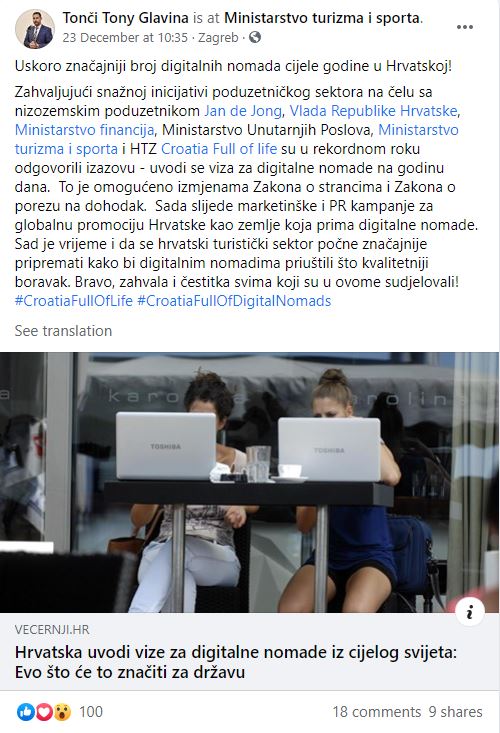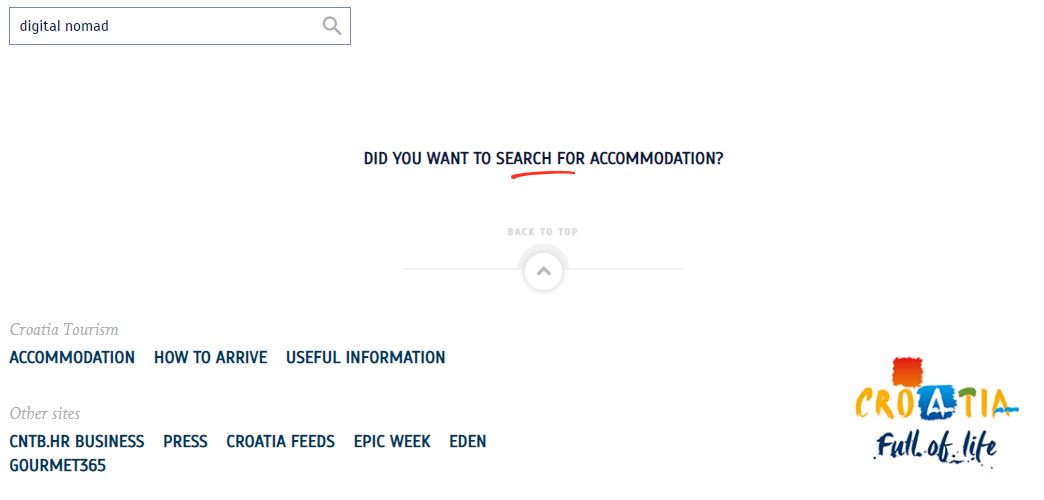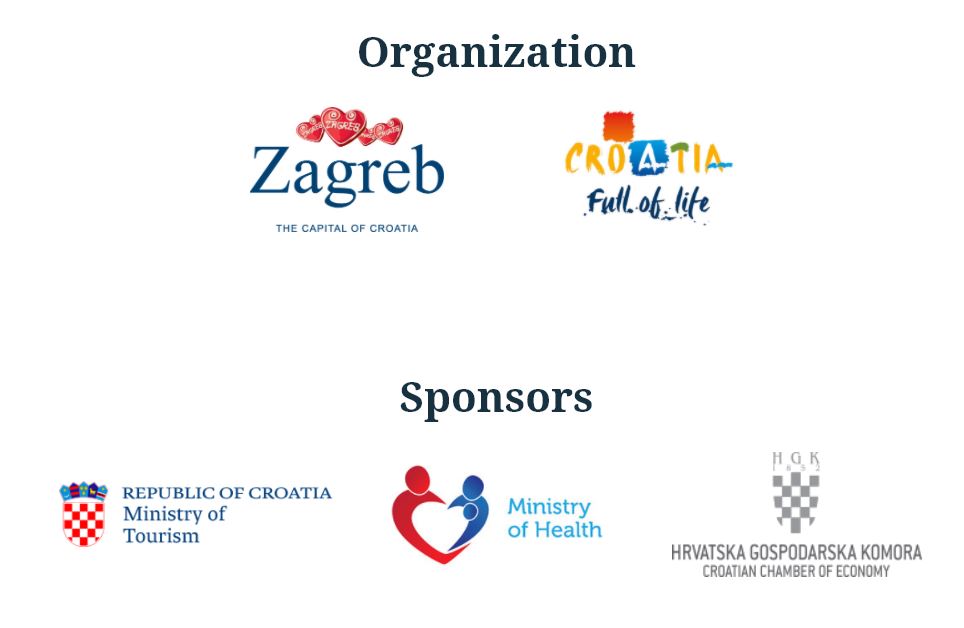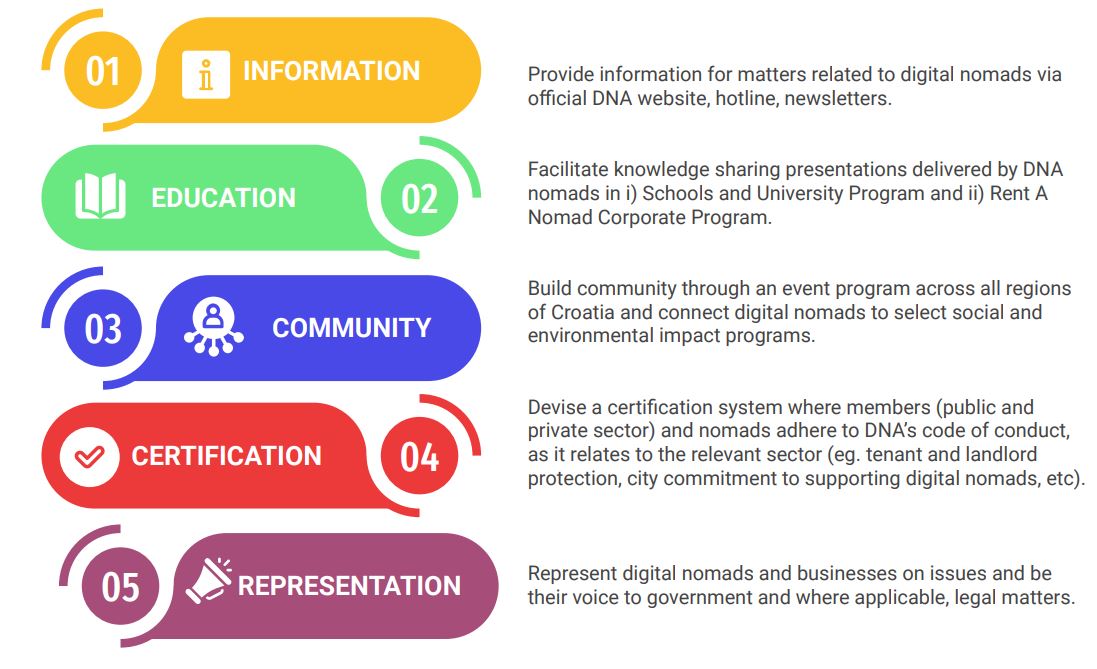Jan de Jong: US Citizen Gets First Croatian Digital Nomad Visa
January 26, 2021 - Just over six months after an open letter to the Prime Minister on LinkedIn, a US citizen gets the first digital nomad visa in Croatia.
Foreigner of the Moment Jan de Jong took to LinkedIn once more this morning, exactly 199 days after writing an open letter to Croatian Prime Minister Andrej Plenkovic on July 11 last year, asking for a digital nomad visa for Croatia.
What happened next was remarkable for seasoned observers of Croatian bureaucracy - things actually started to happen.
Just 44 days later, Plenkovic tweeted a photo with de Jong, announcing that his government would push for the introduction of the visa, which would make Croatia only the second country in the world to offer it, after those very progressive Estonians.
Changes to the tax code and Aliens Act followed, and the legal framework was in place for a digital nomad visa for 12 months, as long as certain criteria were met.
While the visa was technically available from January 1, the final details and online application procedure were still a work in progress, with final delivery expected sometime in the first quarter of 2021.
And then this from de Jong earlier today:
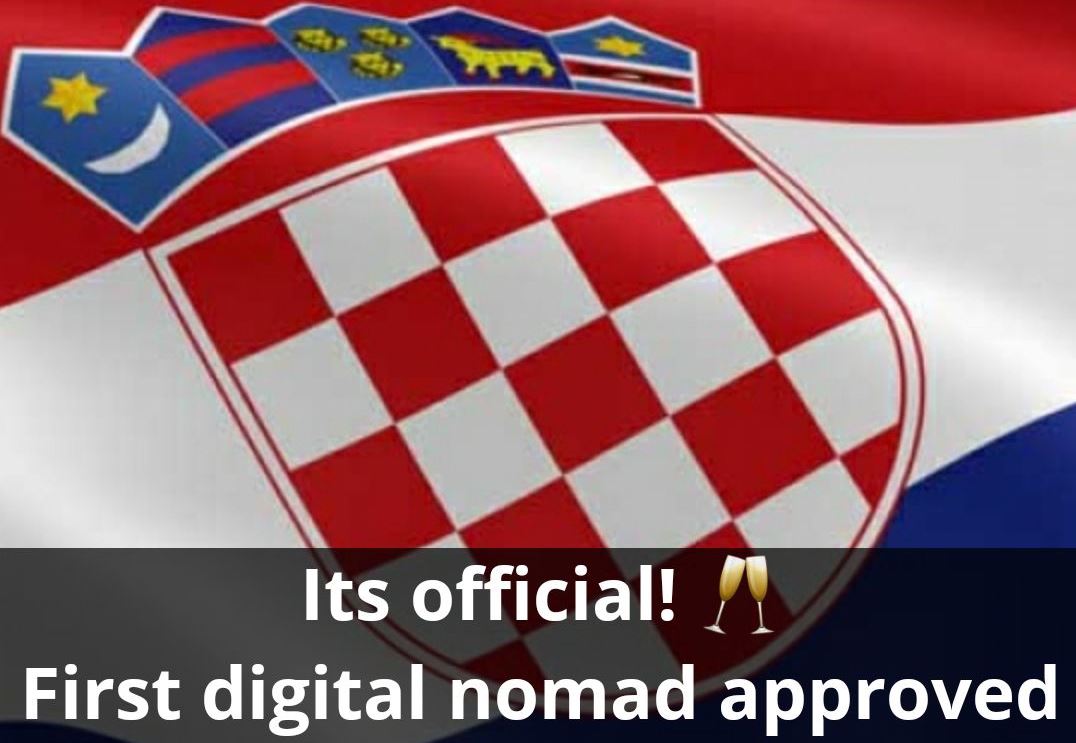
A glorious moment for Croatia ?? as the first #digitalnomad has been approved for his 12- month staying permit in #Croatia.
I know that the Ministry of Interior and Ministarstvo turizma i sporta / Ministry of Tourism and Sport are working on final details to start accepting online applications from digital nomads - and I am expecting this to go live in a matter of weeks from now
But as you can see - as of 01.01.2021. its possible to apply for the "digital nomad visa" (staying permit) at the local police stations all across the country.
Help share this positive event and may many more digital nomads find their temporary home in Croatia.
Thank you all so much for your support!
Poz,
Jan de Jong
Follow me on #LinkedIn for new updates.
#WFH
#Croatia
#LivingTheCroatianDream
I called Jan for a little more detail. It seems that the first successful applicant was an American citizen, who simply went to his local police station and applied and was successful in his application.
My understanding from Jan is that currently, proof of income is under the old rules, but that is expected to change in the coming week, with a proof of income of 16,000 kuna net a month the figure likely to pass.
More details as we get them of course, and while some may prefer to wait for the fuller picture and the online process, I know of several nomads wanting to apply immediately, with at least one planning on a visit to the local police station later this week. Given how new this procedure is, and the different level of responses in police stations around the country, I would expect there to be a little hit and miss in this process. But it doesn't hurt to try.
If any digital nomad is trying this approach and wants to share their experiences, please contact me on This email address is being protected from spambots. You need JavaScript enabled to view it. Subject Nomad Visa.
It all sounds like progress. Well done to Jan and all the others involved. For the latest updates, follow the dedicated TCN digital nomad section.
Zagreb Tourism Adjusting to the Digital Nomad Opportunity
January 25, 2021 – After a challenging 2020, the digital nomad future is looking bright for Zagreb tourism.
It is almost exactly a year since I wrote an article called Why Zagreb is Increasingly Attractive to a Growing Number of Digital Nomads. A year, but seemingly a lifetime, ago. But while 2020 was a terrible year for most of us, it was a very good one for the digital nomad movement, with Zagreb making more advances to position itself as one of the most interesting destinations for remote workers in Europe once things return to a semblance of normality.
In the pre-pandemic article a year ago, I explored 10 reasons why Zagreb was growing in popularity for digital nomads. A year later, all ten are still valid, with several more to add to the list. Affordability, accessibility, safety, English spoken, excellent food & wine, a great tourist destination, a thriving tech scene, quality medical tourism, proximity to the Schengen zone, and that unbeatable relaxed Croatian lifestyle were the ten hooks for digital nomads a year ago.
And then the pandemic hit, shifting the focus of many lives during lockdown to a more virtual world. It was estimated before the pandemic that there would be one billion remote workers by 2035. That estimate now looks very conservative, as many people got used to working from home and away from the office. Many of those jobs will never return to the office – even more digital nomads for tourism in the future.
While the tourism potential of the concept of providing services for digital nomads gradually took hold globally with the prospect of the new normal, things moved forward much faster in Croatia. An open letter to the Croatian Prime Minister from a Dutch entrepreneur asking for a digital nomad visa resulted in Parliament passing legislation for Croatia to become only the second country in Europe to offer a digital nomad visa.
The final bureaucratic touches are being applied to the new permit, which will allow digital nomads of a certain income level to spend 12 months in Zagreb and elsewhere in Croatia, with no local tax burdens. Legislation has already been passed by Parliament, and the visa is scheduled to be available by the end of March latest.
News of the proposed visa went global, leading to intense interest in Croatian destinations, but it also had another positive impact for Zagreb tourism – by generating interest and attention from the city's tourism businesses, keen to learn how to take advantage of the opportunity.
Initial understanding of the needs of digital nomads has moved on from a year ago when the general perception was that an apartment with clean sheets and decent Internet was 'digital nomad friendly.' More Zagreb tourism businesses are understanding that lifestyle and quality of life are also essential elements of the offer, rather than just a bed and WiFi. Some Zagreb hostels, for example, are adapting to the new reality by offering special digital nomad monthly rental packages, including meals, for a fixed fee, with their outreach services available through their hostel services.
The formation of the Digital Nomad Association is another step in the right direction. The Zagreb-based assocation will be fully functional in the coming weeks, offering a bridge of support between nomads, their hosts and issues with the Croatian authorities and bureacracy. There are plans to educate local tourism providers on the needs of these mobile guests, as well as a platform for services such as accommodation which are 'nomad-friendly' which are certified by the association.
Zagreb tourism promotion has changed in the last year as well, offering even more to the visitor. Arguably one of the best initiatives last year was the launch of Around Zagreb, a new platform combining the treasures and activities in Zagreb the city and the surrounding county. The site has been a revelation since going online, offering countless new options to city visitors which had previously been ignored. From hiking and cycling on Sljeme, to wine tasting in Plesivca, truffle hunting in Turopolje, or a round of golf in Zapresic, the lifestyle options for longer-term remote workers are only increasing in Zagreb.
Tourism is changing, and there are many reasons to be positive. The 10 reasons why Zagreb is increasingly attractive to digital nomads are still as true one year on, with several quality additions to the list after the challenges of 2020.
To follow the digital nomad story in Croatia, follow the dedicated TCN section.
Croatia Through the Eyes of a Digital Nomad: Dalmatia’s Underground Fungi is Croatia’s Black Gold
December 28, 2020 - Cyndie Burkhardt continues her nomad lifestyle with her experiences in Croatia - this week with a little truffle hunting in Dalmatia.
The area surrounding Split is joining the exclusive and rarified world of wild truffle hunting, where these underground mushrooms are highly prized delicacies and adorable dogs track them down in secret locations.
One fine day I sat in a cozy hilltop restaurant in Motovun sipping Croatian red wine and gazing at both the picturesque view out across the countryside and the eyes of my handsome boyfriend across the table. We were exploring Istria and I was about to have the most anticipated meal of our trip. The entire place had a gentle whiff of truffles and it filled my nose. The waiter placed two bowls of pasta in front of us and started shaving truffles on top. He asked if I wanted more. I smiled and said “yes!” and he proceeded to cover my dish. I think I melted before I even took a bite.

(Dogs experience the world through scent. The key to training them to find truffles is scent and positive rewards—they smell a truffle, they get a treat.)
That was years ago and I’ve eaten truffle pasta only one other time—until now, that is—but I’ve never forgotten the experience. The area surrounding Split is joining Istria and Zagreb in the truffle economy, as recently reported here. Learning that I could go on a real hunt with dogs, and eat truffles, I jumped at the chance.
Secret location
Ivana Najev met me near Mall of Split and blindfolded me before we drove to meet her father Tonci and the dogs at a secret location. It’s well known that truffles are highly coveted for elite dining tables and they rank among the rarest foods in the world with some of the highest prices. Given the stakes, I was only told that we were going to Mosor Mountain. The intrigue was killing me, but it was certain to be an adventure and I acquiesced.

(Dalmatia’s soil is predominantly black, which produces black truffles like this black winter Tuber Melanosporum.)
Truffle dogs
Once the car stopped and I got out and saw the dogs, they were irresistible. Aldi is seven years old and a seasoned professional. Indi is one and a half years old and is still full of puppy energy. Both are medium sized Lagotto Romagnolos with golden brown curly coats, and they’re absolutely adorable. Their fur reminded me of my grandmother’s hair, God rest her soul. I liked them immediately. The dogs darted around the forest bursting with excitement before getting to work. I laughed out loud watching them run about, their faces and tails full of expression.

(One tactic in training dogs is to stuff toys with truffles and bury them, making a hide-and-seek game fun for them.)
When it was time to hunt the dogs were focused, moving from one spot to another as scents caught their attention. Aldi and Indi work together but they don’t dig in the same hole. When one finds a truffle spot the other one watches over his shoulder, as if waiting for the results. I don’t know if this is typical behavior for truffle dogs but it looked like team spirit, sort of like saying “hey buddy, nice score” and giving a high-five. Sometimes a dog would lay down right next to his spot while Tonci or Ivana dug into the soil to retrieve the prize.

(Lagotto Romagnolos are the primary dogs specifically bred for truffle hunting. Truffle dogs can be expensive, it's not unheard of to pay $4,000 for a prime Lagotto and another $5,000 to train it. Training starts from two months of age and takes about two years for a dog to mature and become really good. They want to play, but they’re still working.)
Seductive smell
These trained animals were constantly moving and sniffing for good reason. As a truffle matures it releases a pungent odor when ripe, which is key to the hunting process. The smell comes from volatile organic compounds, similar to pheromones released by a male pig. I knew about truffle hunting with pigs and now I know the reason—they’re an aphrodisiac for a female. Pigs are natural hunters but also feeders, which is an abrupt way to watch your hard work and profit go down the drain; dogs are preferred.
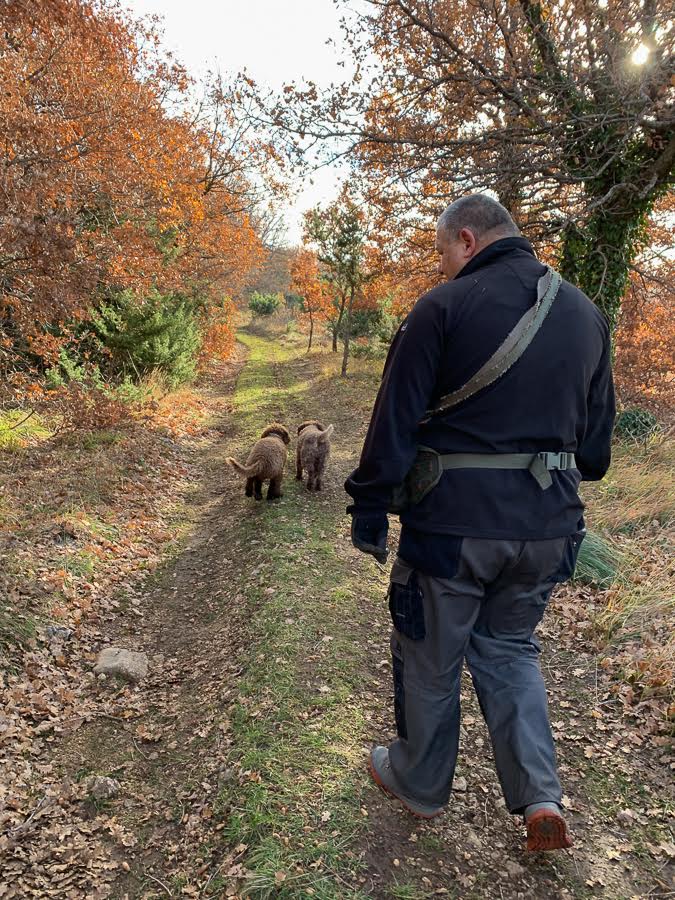
(Aldi and Indi are more than working dogs, they’re beloved family pets. They have their own room in the house with a carpet, a couch, and a television. What do they eat? Regular dog food.)
Intoxicating appeal
It turns out there’s more to truffles than sex appeal. Researchers in Italy found that black truffles produce a natural chemical compound similar to marijuana's active compound tetrahydrocannabinol (THC). Truffles are not chemically addictive but many people find them intoxicating. “You start to eat and you always want them,” says Ivana. “The dogs have the same reaction, it’s like a drug. Indi lays down on the hole because the smell makes him happy, and crazy.”

(A truffle’s size and smell are factored into their overall value, which can reach into tens of thousands of dollars at market.)
Nature Lover
How does someone get into this business anyway? It helps to be a nature lover and like most Croatians, Tonci Najev thrives on being outdoors. This is clear from his notable background as a professional diver. His feats include being on the expedition team that made the first-ever dive into the Red Lake, near Imotski, and earning records for descending 100+ meters (330+ feet) with pure oxygen, no mixing of gases in the tank.
In those days Tonci spent the mornings diving for sea coral and the afternoons hiking. Up in Split’s mountains, locals told him they’d found truffles. His interest was piqued and he began researching the land, the trees, and the dogs. Today, with perseverance and persistence, Tonci has discovered 100+ truffle locations and he holds the first and only truffle hunting business permit in Dalmatia.
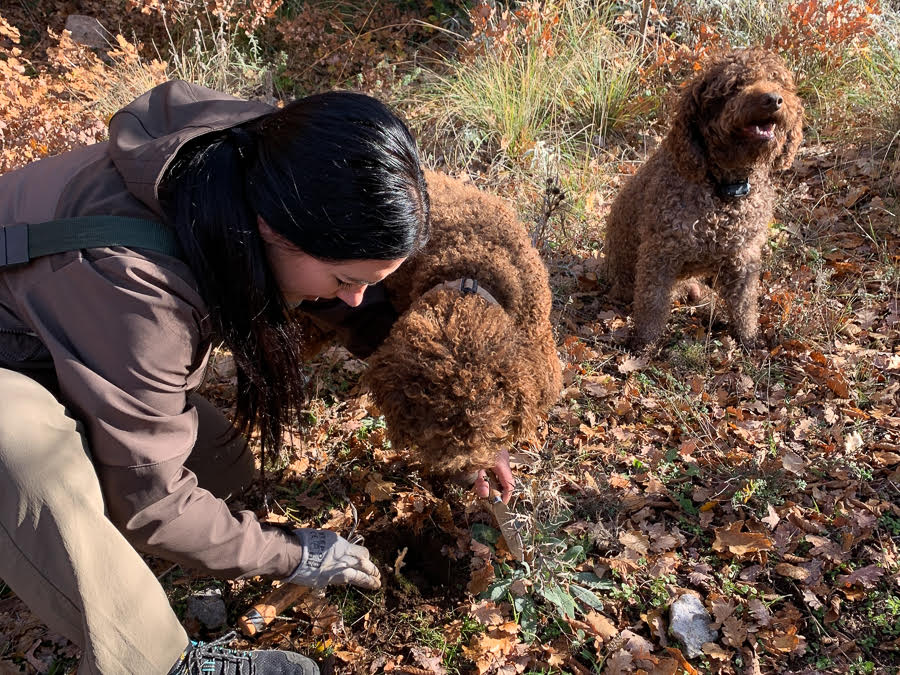
(People often ask if the dogs work just to get a reward. Ivana says Indi and Aldi are eager to please and to see their father (Tonci) happy.)
Black and white
Two main truffle species are among the most esteemed food products in the Mediterranean: Piedmont/Italian white truffles (tuber magnatum pico) and Périgord/French black truffles (tuber melanosporum). They are the first and second most expensive truffles in the world, respectively.
They grow wild in the forests of southern Europe and they’re native to France, Spain, Italy, Slovenia, and Croatia. Limited availability contributes to their value, as the majority of truffles on the market are cultivated.
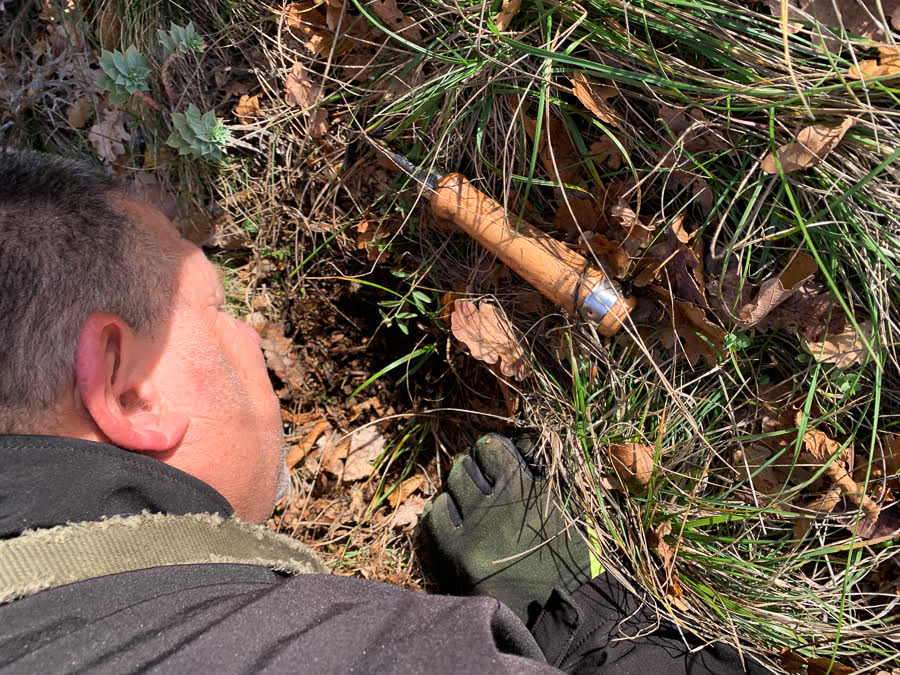
(What do Aldi and Indi eat? Regular dog food.)
Exclusive and expensive
Given the secret growing locations, labor-intensive sourcing, specially trained animals, limited quantity, and a short lifespan, truffes are a delicacy in the same camp as other rare foods: saffron, caviar, kobe beef, Densuke watermelon, and fugu.
In 2020, white winter truffles (magnatum) sold in the range of $3,000-$4,000 USD per lb. (retail) and black winter truffles (melanosporum) sold for an average of $1,500 USD per lb. Prices constantly change and vary per the yields of the growing season, the class of truffles (including size and smell), and the rarity of the type. I found reports on European wild truffles selling at auction for hundreds of thousands of dollars. Damn. I’d love to know the life story of one of those mushrooms.
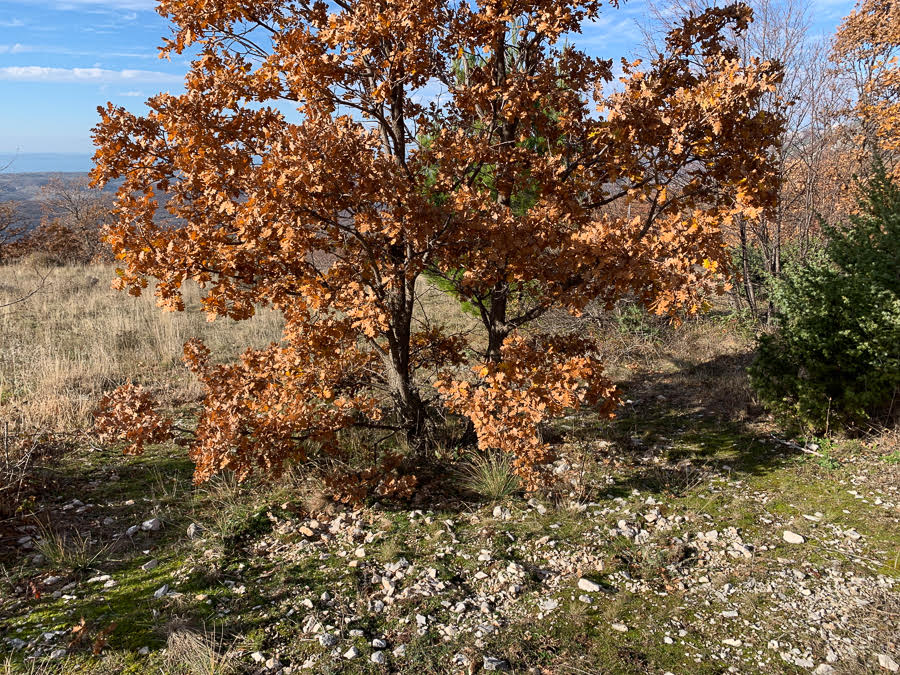
(Dalmatia’s oak trees and karst landscape make a special environment that’s ideal for wild truffles to grow.)
Dalmatian truffles
On Mosor, we found two types of black winter truffles: tuber melanosporum and tuber brumale. Yesss! We got the good ones! I was impressed that we found anything at all, the ground seems to favor rocks. It’s described as a karst landscape, one that’s made up of limestone and has some sort of a natural drainage system beneath. As it turns out, the terrain and Croatia’s climate make an ideal habitat for wild truffles.
One other thing is needed—the right tree. Truffles grow underground in symbiosis with certain trees; specifically, truffle spores and tree roots share nutrients. Dalmatia delivers on this too and some of the most common “truffle trees” grow here—Hrast (Oak), Grab (Hornbeam), Smrič (Spruce/shrub), Corylus Avellana (Hazel), and Populus Alba (Poplar).
Dobak Tek
After a successful morning hunting, it was time to eat. Our dining room was Mosor Mountain, under a large oak tree, appropriately. Once again, I enjoyed fresh truffle pasta—prepared right in front of me—while sipping local wine and gazing at Croatia’s beautiful scenery. A spread of cheese, meat, and soparnik was the second course, all of it topped with freshly shaved truffles. I was glad I had skipped breakfast.
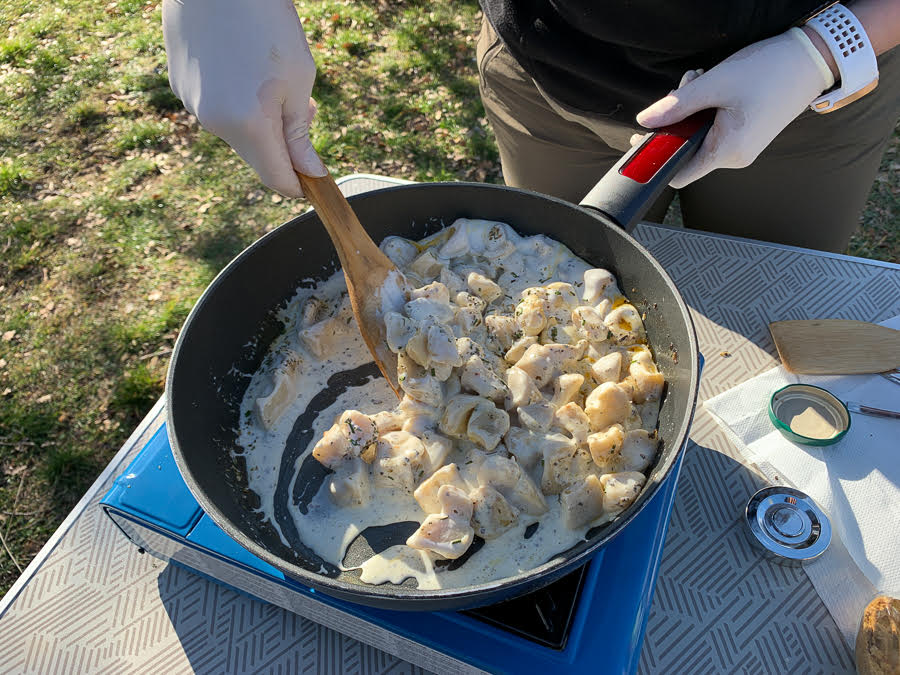
(The morning hunt culminates with a fresh meal of homemade truffle pasta. Once a truffle has been unearthed, its journey from ground to plate should be no longer than ten days.)
It’s funny, the pasta was delicious but I can’t describe the taste that truffles add. Ton
i said chocolate and strawberry but I’d go toward earthy and musky. My palate isn’t that refined but I know what I like and I craved more. I really think there’s something to that seductive, intoxicating aroma; it engulfs your senses and your brain like a potion. Maybe the mere anticipation of truffles is what drives behavior such as auction madness…
Winding down
After an upbeat morning I was pleasantly surprised that the tour kept going. On the drive back to our meeting location Ivana pointed out several places of cultural and historical importance—the remains of Skočiba, an old village in Gata that dates back to the Middle Ages; the church of Sveti Jure, on one of the highest mountain peaks in the country. It was a nice way to round things off and see more of Dalmatia’s heritage.
Leaving the seductive world of truffles, I thought about a modest comment Ivana made when we first discussed where to meet, “We do not have an office, nature is all we need.” I love that. I scored another great day outdoors, with good people and animals, in this country that I’m coming to appreciate more and more. By the way, there was no blindfold.
Learn more about tours with Truffle Hunting Dalmatia on the website.
Learn more at TCN’s Digital Nomads channel.
Story and photographs ©2020, Cyndie Burkhardt. https://photo-diaries.com
For more of Cyndie's experiences, check out her Croatia Through the Eyes of a Digital Nomad column.
After Digital Nomads, Will Croatian Tourism Chiefs Act on 4 More Gifts?
Two small but very significant things for Croatian tourism happened in one Facebook post just before Christmas.
The post was by arguably the most communicative senior member of the government on social media, State Secretary for Tourism, Tonci Glavina, who regularly updates his followers on good news regarding Croatian tourism and government activity, communication which is very welcome.
And Glavina's status update of December 23 caught my attention in particular, for two reasons, and opens a small window of opportunity for progressing tourism strategy in Croatia:
The post was significant firstly as this was the first time (to my knowledge) that a senior government official had given a concrete statement on the reality of the Croatian digital nomad visa since Prime Minister Plenkovic tweeted his intention in late August to act on a LinkedIn open letter from Dutch entrepreneur Jan de Jong asking for the introduction of a digital nomad visa for Croatia. As regular readers of TCN will know, digital nomad tourism is something we have been advocating for more than 18 months now, as well as reporting on progress on the visa every step of the way, from the law changes in the Aliens Act and the tax code. You can follow the TCN digital nomad coverage past, present and future here. Having a senior government official confirm what we have been reporting for months is most welcome, as is the additional news that Glavina brought that there will soon be a big global promotion by the Croatian National Tourist Board to attract digital nomads to Croatia.
The second thing that was significant in Glavina's post was his acknowledgment that this was an initiative from the private sector, namely the efforts of de Jong and those supporting his initiative. I have long advocated for the private sector to play a more active role in shaping Croatia's tourism, simply because the private tourism sector understands tourism so much better than those running Croatian tourism (in my opinion), and in many cases they manage to succeed in spite of official tourism strategies, rather than because of them. So to see the Croatian tourism chiefs not only recognise a private sector initiative but to make it a key theme for 2021 promotion is a very encouraging development indeed. And one I hope will be a precedent for future development.
National tourist board director was also ebullient about the prospects of digital nomad tourism and was quoted in Vecernji List, timeline December 23, 2020:
We plan various activities to position our country as an attractive destination for digital nomads. The focus of marketing campaigns will be on the fact that Croatia can guarantee a safe and quality stay for digital nomads. We will emphasize the excellent transport connections and the geographical position of an EU country in which many speak English and which has an excellent infrastructure and quality of offer. In the promotion, we will focus on the fact that our life is accessible according to European standards, that we have good health care with well-known benefits such as a favorable climate, beautiful nature and rich cultural and historical heritage. At the beginning of 2021, an online campaign is planned in Great Britain, the USA and Australia, and we will soon start teaser activities, ie posts with initial information about the legislative changes on social networks Facebook, Twitter and LinkedIn - says the director of the Croatian Tourist Board Kristjan Stanicic.
This is all wonderful (and I mean that sincerely), but I have a question which is important if we are to develop this concept of public-private cooperation:
If de Jong had not posted his online appeal to Plenkovic, and if there had been no private sector initiative regarding the digital nomad visa, would our Croatian tourism chiefs even be talking about digital nomads as a tourism strategy?
A few weeks before de Jong posted his LinkedIn request, I request a meeting with the national tourist board to present three new initiatives for Croatian tourism. The three ideas were a concept to brand Trogir the first digital nomad town in Croatia, a new sporting event to celebrate Dalmatia's unique sporting heritage and tradition with the Olympics of Traditional Dalmatian Games, and a concept for developing religious tourism based on the only certified miracle in Croatia, the Eucharistic Miracle of Ludbreg.
I left the meeting empty-handed but with plenty to think about. Funding rules had changed and I was advised to approach regional tourist boards on the financial side. And while I was more than a little surprised that one of the senior tourist board members couldn't name Croatia's only miracle, it was the reaction to the digital nomad project that stayed with me. While my Trogir idea was apparently good, I was advised to check on taxation rules for nomads planning to work in Croatia. With the situation as it was, it was not something that they could officially promote.
And that, I believe, is how the situation would be today without de Jong's initiative and all that followed.
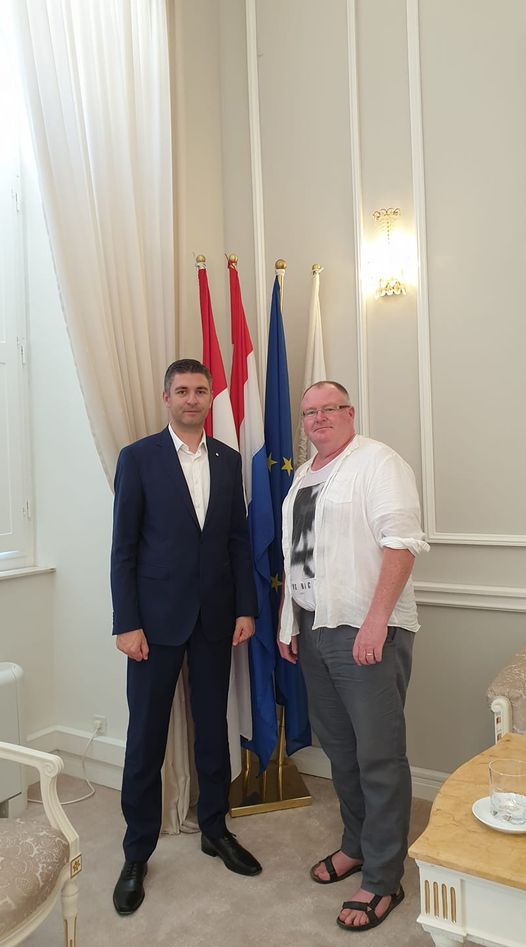
Private initiatives to promote digital nomad tourism continued, and there were more receptive ears. None more so than Dubrovnik, who not only embraced the concept, but acted on it very quickly. After a very cordial meeting with Mayor of Dubrovnik, Mato Frankovic, in July, wheels were set in motion to prepare for an international digital nomad contest to work with the city on improving its digital nomad offering and branding.
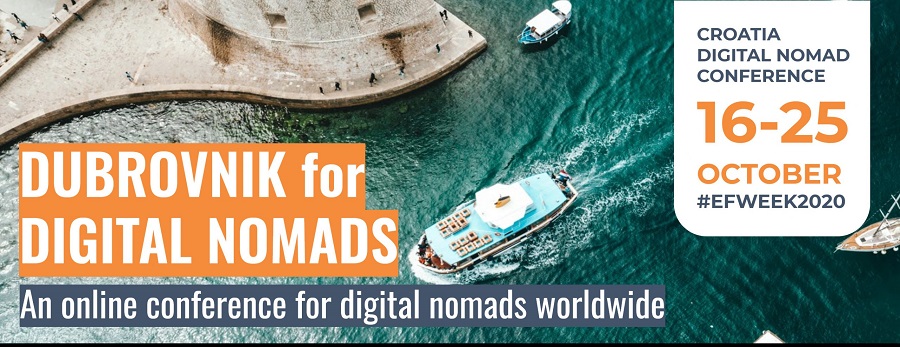
Corona budget issues have delayed that project until April/May 2021, but Tanja Polegubic from Saltwater Nomads suggested Dubrovnik start the discussion by organising Croatia's first-ever digital nomad conference, Digital Nomads for Dubrovnik, in October, in partnership with the Dubrovnik Tourist Board, City of Dubrovnik and TCN.
News of the imminent visa and the Dubrovnik conference caused quite a buzz internationally, and there were many articles in the international media about Croatia as a new hot spot for remote workers, with the Dubrovnik for Digital Nomads conference even getting a mention in the Washington Post.
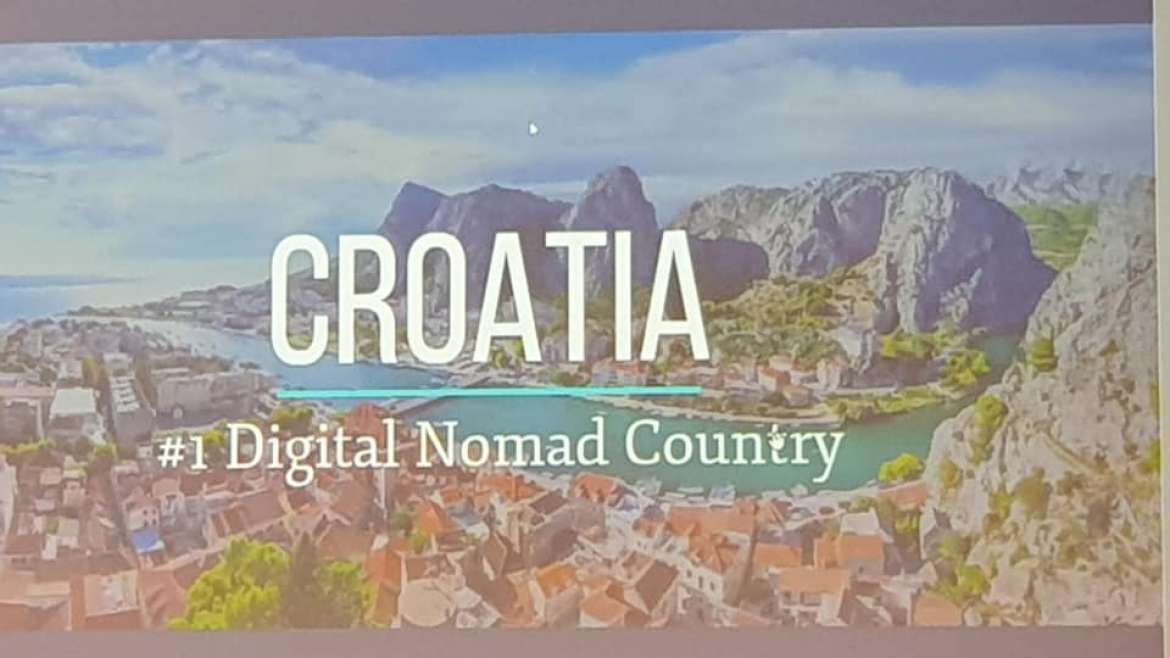
And there was plenty of more niche promotion within the digital nomad community, with TravelOffPath co-founder Kashlee Kucheran, a website and community dedicated to global travel information for remote workers, extolling the virtues of Croatia as a destination for digital nomads - you can learn more in this TCN interview with Kashlee.
Zagreb has also been very receptive to the digital nomad opportunity. Sadly, we had to cancel plans for a Digital Nomad Bootcamp as part of Advent in Zagreb due to the pandemic, but we will be announcing a great initiative in partnership with Zagreb in the new year.
And yet, despite all the activity and December 23 announcement and upbeat quote from Director Stanicic, not a single word about this new tourist sector on the national tourist board site. This is what greets you when you search the national tourist board website for information about digital nomads (see above).
The main point of this article is to show how important the private sector is for tourism and what a positive effect it could - and should - have, and so it is worth taking a closer look at the origins of this initiative, as well as looking at others which may exist. As Jan de Jong has explained, he is also quite new to the concept of digital nomad tourism. Back in May, he was due to speak at a tourism conference and asked me for some advice about tourism initiatives. I sent him a few articles to read including two about digital nomad tourism, both written in mid-2019, a full 18 months before Director Stanicic's enthusiastic embracing of his new initiative.
How Croatia is Becoming Increasingly Attractive for the Digital Nomad Lifestyle (June 19, 2019)
Branding Croatia for the Future: 5 Gifts and Trends to Focus On (June 9, 2019)
If these articles planted a seed in de Jong's mind regarding digital nomad tourism, who in turn planted a seed in the Prime Minister's mind with his LinkedIn post, who in turn planted more seeds for Croatian tourism chiefs, which results in a visa and strategy for digital nomad tourism for Croatia, then I will be very happy. There have been lots of people involved from the private sector on the way as I explored in Croatia's Digital Nomad Visa Story: The Expat Contribution.
The big question is that if this approach of private initiative which is helped along the way with a collection of different skillsets and influences can be embraced by the Croatian tourism chiefs, are there any other such ideas which could yield similar fruit? And the answer is an emphatic YES! Here are just 4, and let's go back to that 2019 article, Branding Croatia for the Future: 5 Gifts and Trends to Focus On.
1. Medical Tourism
One sector which is a real growth opportunity for Croatian where the private sector is trailblazing is medical tourism. It is an area I have written a lot about in the last three years, not only about Croatia, but also internationally, and it was a real honour to be named International Medical Travel Journalist of the Year in Kuala Lumpur recently by one of the star performers of the global medical tourism industry - the Malaysia Healthcare Travel Council.
I have attended several conferences, both national and international, and interviewed many of the bigger names in the medical tourism industry over the last few years. I have been constantly struck by how big the potential is for Croatia, whose reputation within the industry is very high, so at odds with the delivery of effective official promotion. At the same time, the private medical tourism companies are achieving great visibility and partnerships in order to develop not only their only clinics and hospitals, but also the Croatian industry as a whole. It is quite telling that the brand of the Kvarner Health Cluster has a bigger brand within the industry than Croatia as a national brand, for example.
Unlike digital nomad tourism, which as we have seen has yet to get a mention on the official website despite the apparently lofty plans for 2021, there have been sporadic - and particularly ineffective - efforts to officially promote medical tourism. The video above is a case in point - dating back to 2017. Some pretty drone shots of Croatia and some footage in some clinics, but with no coherent message, and with almost no engagement - 43 likes and zero comments despite over a million views suggests another paid campaign that failed to engage.
Fast forward two years and a shiny medical tourism conference called Health Spot Croatia.
All the big names were there in terms of sponsorship, and the list of speakers was no less impressive as an official show of strength.
No less than two ministers, the president of the Croatian Chamber of Economy and Mayor of Zagreb in the welcome speeches alone.
And the dividend from the conference once the lights went off, the initial column inches written? Very little. Indeed my understanding is that the health tourism department of the Ministry of Health was disbanded earlier this year.
Meanwhile, in the private sector, Croatia is excelling on the global stage, working with the biggest names in healthcare.
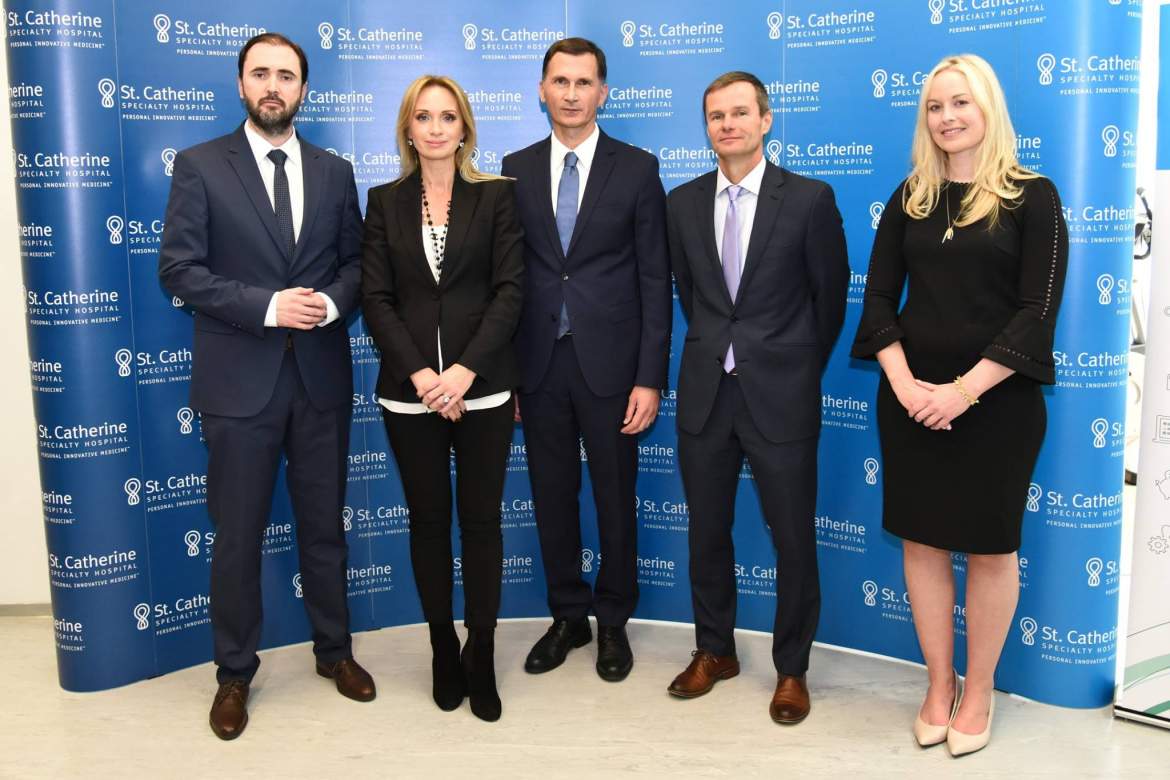
St. Catherine's Specialty Hospital, a member of the Leading Hospitals of the World, became the first place in Europe to offer the RightMed OneOme pharmacogenetic test, developed in partnership with Mayo Clinic.
Cleveland Clinic has also been taking an interest in the Croatian medical tourism story after links were forged by Ognjen Bagatin of Bagatin Clinic on a visit to Cleveland. Cleveland Clinic CEO Tom Mihaljevic pledged his support for perhaps the most ambitious initiative to put Croatian medical tourism on the map - EPIC 2020.
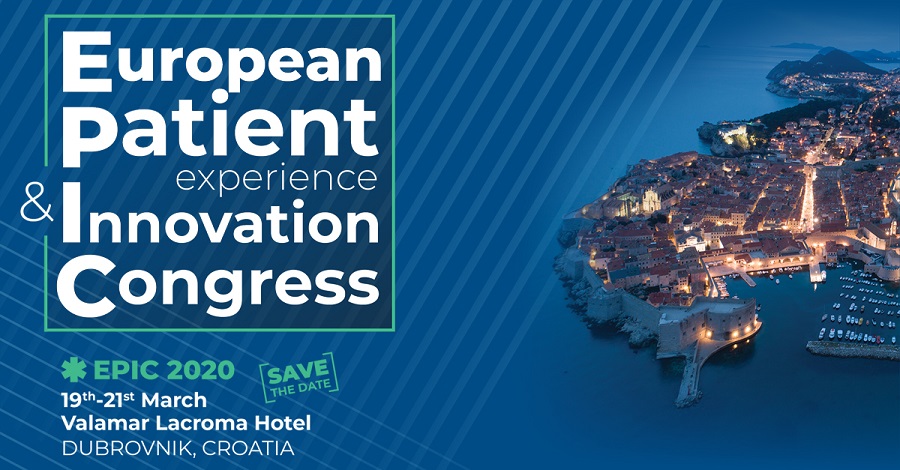
But for the pandemic, EPIC 2020 would have been Europe's first European Patient Experience and Innovation Congress, organised by Bagatin Clinic in collaboration with Cleveland Clinic, with a world-class list of international speakers, including several from Mayo and Cleveland Clinics.
Bagatin Clinic has become synonymous with Croatian medical tourism excellence globally, thanks largely to the extraordinary efforts of Ognjen Bagatin, who has travelled the globe several times over to promote Croatia and its health tourism story. He has done more than perhaps anyone to develop this sector of Croatian tourism, as well as being an authoritative and inspirational speaker on the global level. It was a pleasure to witness him collect the award on behalf of Bagatin Clinic for Best International Cosmetic Surgery Clinic at the International Medical Travel Journal awards and conference in Berlin in 2019. IMTJ is the leading medical tourism conference in the world, attracting exhibitors from all over the world. While official promotional bodies were out in force from the biggest countries in the industry, including South Korea, Malaysia and Germany, the Croatian presence was limited to Bagatin and the Kvarner Health Cluster.
Unlike digital nomad tourism, which is just in its infancy, there is considerable experience and expertise in the private medical tourism sector in Croatia, as well as a vision and international credibility. If de Jong's private initiative for digital nomads could be replicated for the medical tourism industry, the possibilities are enticing indeed.
2. Lessons from Portugal - retirees and the Golden Visa.
A little legislation change is what is required to bring in the digital nomad visa, thereby making Croatia more accessible to remote workers to come and live in Croatia and contribute their spending power to the Croatian economy.
And a little more legislation change in another area could also boost the State coffers. With its temperate climate and relaxed lifestyle, Croatia is an ideal destination for pensioners to spend at least some of their retirement time. The lower cost of living compared to Western countries also makes Croatia an attractive option.
Just as I have come across many digital nomads from outside the EU looking to spend more time in Croatia, so too people wanting to retire and spend time here.
And spend money. As Portugal has figured out, retirees looking to relocate to the sun are independently wealthy and not going to take away and local jobs. And they tend to have affluent friends and family who come to visit. The Portuguese Golden Visa programme has been a big success, something which can easily be emulated by Croatia - Lessons from Portugal: Taking Advantage of the Retirement Lifestyle Opportunity.
3. Wine - Home of Original Zin and 130 Other Indigenous Grape Treasures
You will not be in Croatia long before you hear about how great the wines are. And they truly are. Home of the original Zinfandel and 130 other indigenous grape varieties, Croatia also offers some very diverse wine regions and exceptional tasting experiences. With the popularity of gourmet tourism in France, Spain, Italy and Germany, the potential for Croatia to present its world-class food and wine offering is there. After all, didn't the late, great Anthony Bourdain wax lyrical about Croatia's "world-class food, world-class wine, world-class cheese" back in 2011.
And yet...
Where to go to find the information about the wine roads and wine tasting experiences?
Dalmatia may be the home of original Zinfandel (a FANTASTIC hook for the American market in particular), but there is no Dalmatian wine road. In fact, trying to find information about any wine roads is rather a challenge. A few years ago, I asked the national tourist board to send me a list of wine roads for Croatia. They were very helpful saying that they did not have that information but would contact the county tourist boards individually and get the information of wine roads by county. They did send information on all but one county, in varying degrees of quality, but mostly it was just a list of names. Which was better than the help from the Ministry of Tourism, who insisted that there was a map of the Biokovo Wine Road, a wine road which no wine professional in Croatia I have spoken to knows ever exists.
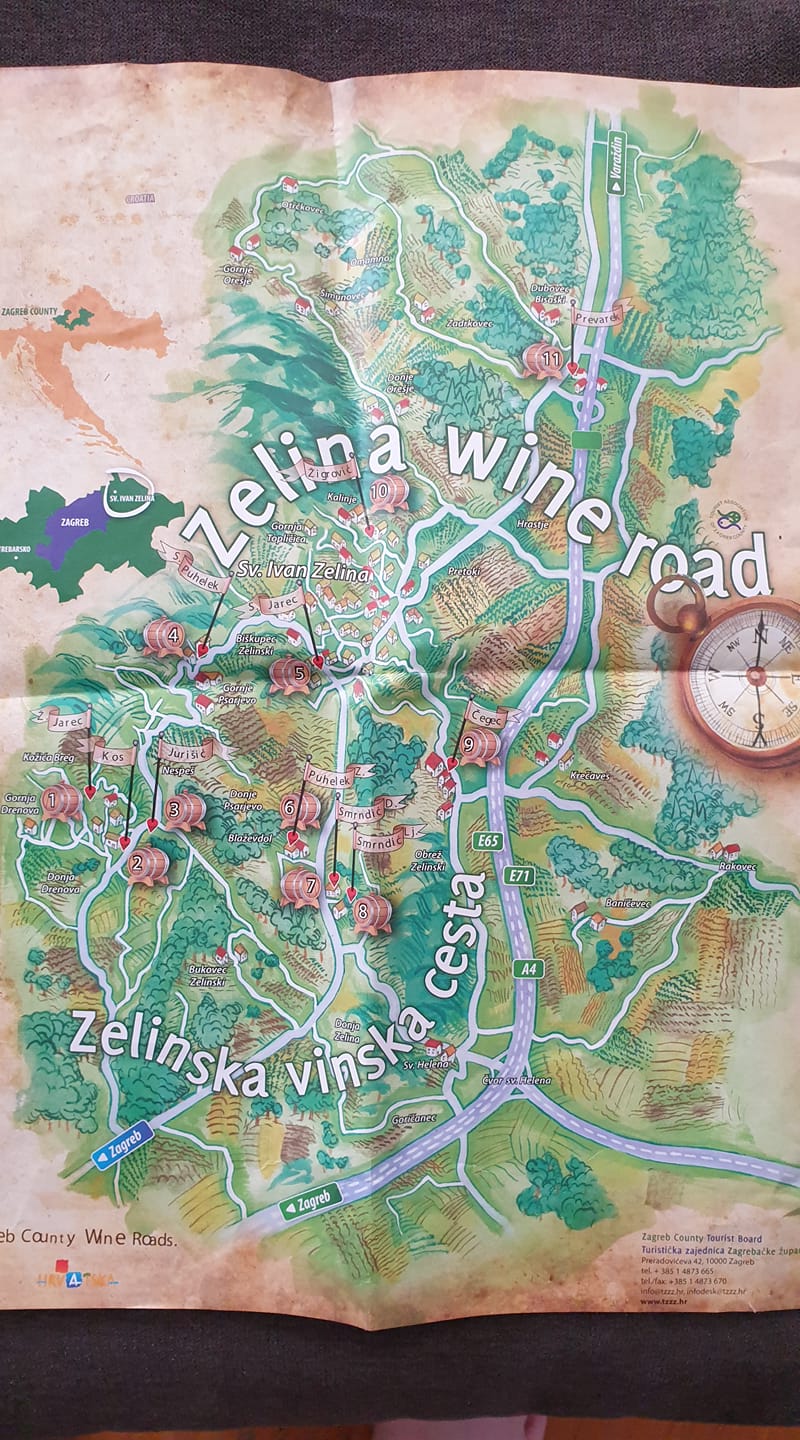
That is not to say that it is all bad. I was much cheered on a recent visit to the Zagreb County Tourist Board to come across this very useful map for the wine lover. On the one side, a map of the 11 wineries on the Zelina wine road, and on the other all the contact details, opening hours and tasting experiences on offer, details which you can also find on the official website.
How hard would it be to do this on a national level, and to put up some signs for wine roads on a national level? To actually make finding information about wine roads and wineries user-friendly? There are signed wine roads at a local (and sometimes regional) level, but it Croatia wants to be taken seriously as a wine destination, it should start taking its wine promotion seriously. Need some help? Lessons from Macedonia: How Croatia Can Learn How to Market Wine. Interestingly, Macedonia's biggest export market is... Croatia.
4. Maximising the Tesla (and Rimac) brand
Was Nikola Tesla a Serb or a Croat? If you are looking for the answer in how he is promoted in both countries today, then there is no contest. Despite visiting Belgrade only once, the international airport bears his name, and Serbia celebrates Science Day each year on his birthday, July 10.
By contrast, the birthplace of Tesla, the village of Smiljan in modern-day Croatia near Gospic, is a very humble affair, and a great opportunity for Croatia which is currently very underutilised. As I wrote in my 2019 Branding Croatia article:
From Tesla to Rimac - the home of clean energy and innovation
Nikola Tesla was a genius, whose inventions transformed the way we live. He was also an ethnic Serb who was born and grew up in the village of Smiljan, in which is today modern Croatia. Tesla only visited Serbia once, and yet Belgrade named its international airport after him. Meanwhile in Croatia...
Smiljan is a lovely spot, with plenty of space. As Telsa's birthplace, it is also the symbolic home of the Tesla revolution. So let's give people a product to match that potential, an Old Trafford Theatre of Dreams for the e-mobility generation. I have been fortunate to have taken part in the Nikola Tesla EV Rally a few times. One of the undoubted highlights of the trip for these Tesla car converts is a visit to Smiljan, a chance to pay homage to Nikola Tesla and where it all began.
Looking forward, as branding Croatia should be doing, something like 75% of tourists to Croatia arrive by car. By 2030, there will be 21 million new electric vehicles on Europe's roads. From a tourism and economic viewpoint, it would make sense for Croatia to be at the forefront of the e-revolution, but with a gift of the Tesla birthplace, a brand to build on and develop for sure. Especially when Croatia has a modern-day Tesla in the shape of Mate Rimac, whose electric supercars and technology is taking the world by storm.
The energy this year to push the Croatian digital nomad story forward has been inspiring, as well as encouraging. If Croatian bureaucracy really can work that fast, and if the Croatian tourism chiefs really can react to private initiatives such as de Jong's visa proposal, then it can do the same in other sectors, for the ultimate benefit of tourists, tourism providers, and the Croatian economy. So with the digital nomad box almost ticked, can we now turn our attention to legislation for foreign retirees, empower the medical tourism industry to realise its vision, coordinate a unified and comprehensive introduction to Croatia's wine potential, or raise the level of Nikola Tesla promotion to the level the great man deserves?
As with the nomad visa, none of these is overly taxing, and the benefits for Croatia will be considerable.
Digital Nomad Life in Croatia: Jess and Thibaud, from San Francisco to Jelsa
December 21, 2020- As the number of digital nomads rises globally, some are choosing to spend some of their time in Croatia. Continuing our TCN series meeting international digital nomads calling Croatia their temporary home. Meet Jess and Thibaud, from San Francisco to Jelsa on Hvar.
It has been a very strange year for tourism, but not all of it has been bad news.
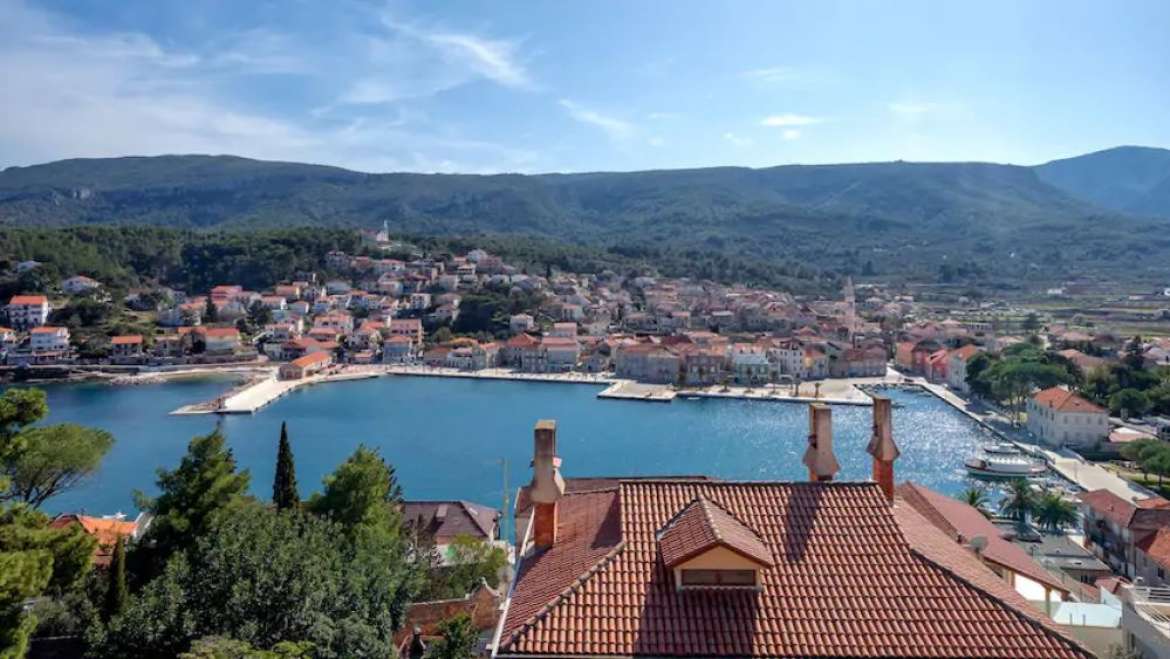
Renting our AirBnB apartment, Panorama Penthouse Jelsa, for example. Who would have imagined this time last year that the apartment would be empty for large parts of the early summer, but then booked solid for the winter months when it is normally empty? And by not one, but two digital nomad couples...
Meet Jess and Thibaud, the latest digital nomads in our series meeting remote workers choosing Croatia. What does San Francisco have that you couldn't possibly find in Jelsa anyway?
Tell us a bit about you and your work.
Thibaud grew up in Paris and has spent most of his life in Northern California. I’m from New York, which is where I lived until we moved to San Francisco a few years ago. We love to travel and spent five months backpacking in Asia in 2018. If I had to describe us in a sentence, I’d say we’re an adventurous pair that likes to live life to the fullest.
We work in the technology sector and have spent the majority of our careers at companies based in Silicon Valley. As a product manager, Thibaud designs and builds digital experiences for software platforms and tools. He sets the strategy and partners with engineering, design and business teams to make that happen. I work in business development, specializing in fintech. My job is to help companies grow and improve their market positions through client/supplier relationships and partnerships. Fun fact: we met at work!
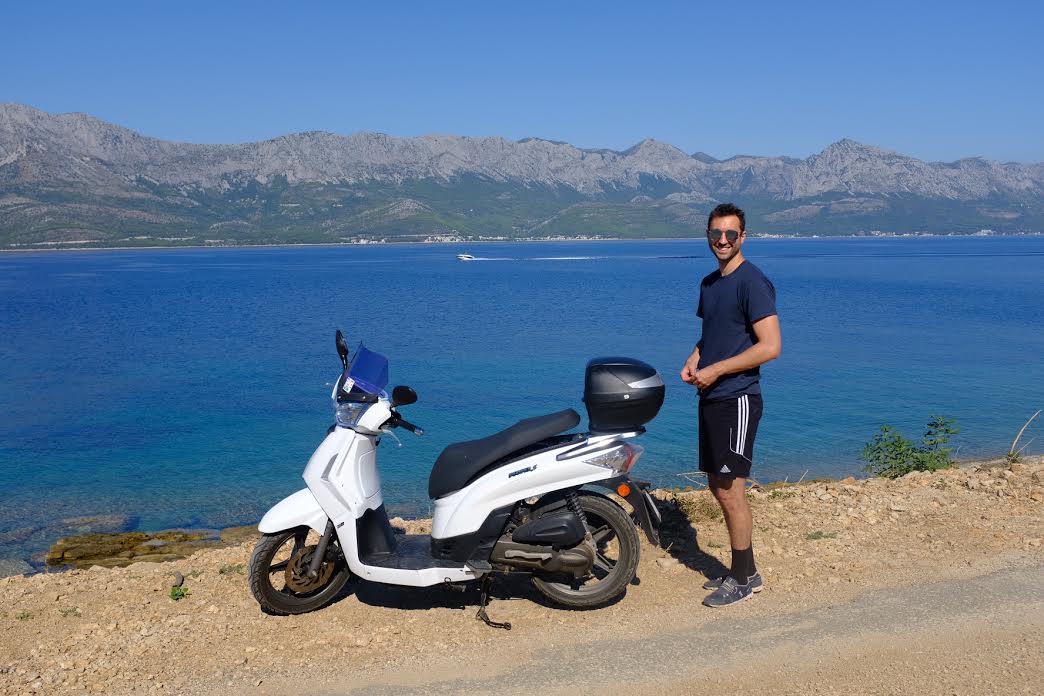
Pros and cons of working remotely?
Some of the more challenging aspects have been exacerbated by the pandemic - for example, the lack of social interaction. During normal times, people are able to meet with friends and family and go about their daily lives outside their homes, which balances the fact that they may not see their colleagues regularly. With the lockdowns, working from shared spaces or cafes isn’t an option, so it can be a bit isolating. Living and working in the place can lead to overworking, so it’s been important for us to set some of the boundaries that exist with non-remote work. Eating meals away from our laptops, keeping to a loose routine, and taking time for movement have been helpful ways to break up the day.
More effort is required to build and maintain relationships with colleagues when working remotely. Information can fall through the cracks without those impromptu desk-side chats in the office and that glass of wine with your teammate at the end of the workday. Remote work requires more mindfulness about how you interact with colleagues and clients.
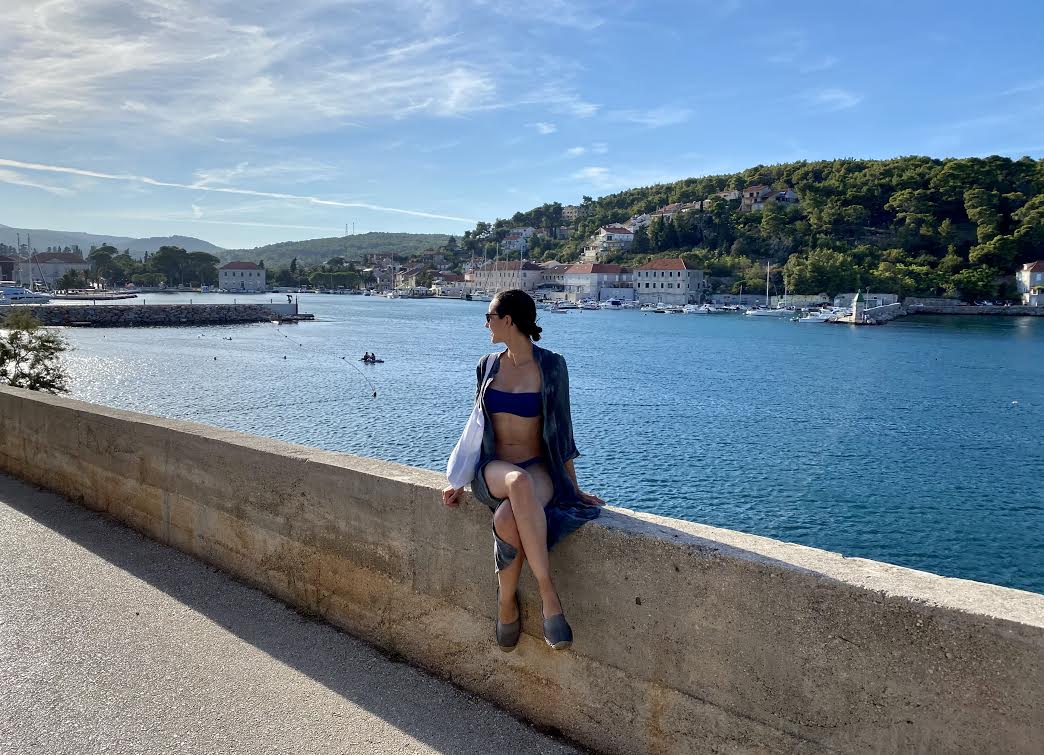
The overall flexibility that remote work enables is the biggest pro. Without it, the term ‘digital nomad’ wouldn’t be a thing! We feel fortunate that our roles can be done remotely, as opposed to many professions that require physical presence. Not being tied down to one location and being able to experience new places is one of the best things about working remotely. Not having to commute is great as it saves time and reduces your carbon footprint. Being able to prepare your own meals is a pro. Having the ability to choose your working setup is a pro, such as taking calls while on a walk or switching rooms to follow the sun. Having the option to wear whatever you’re most comfortable in everyday is also a nice perk.
Remote work also enables companies to hire the best talent regardless of where people live. Being able to build teams across borders can be positive for both employers and employees from an economic perspective and also help drive diversity of thought.
This isn’t an exhaustive list of the pros and cons, but highlights some of the aspects of working from home. For us, the benefits of remote work outweigh the challenges.
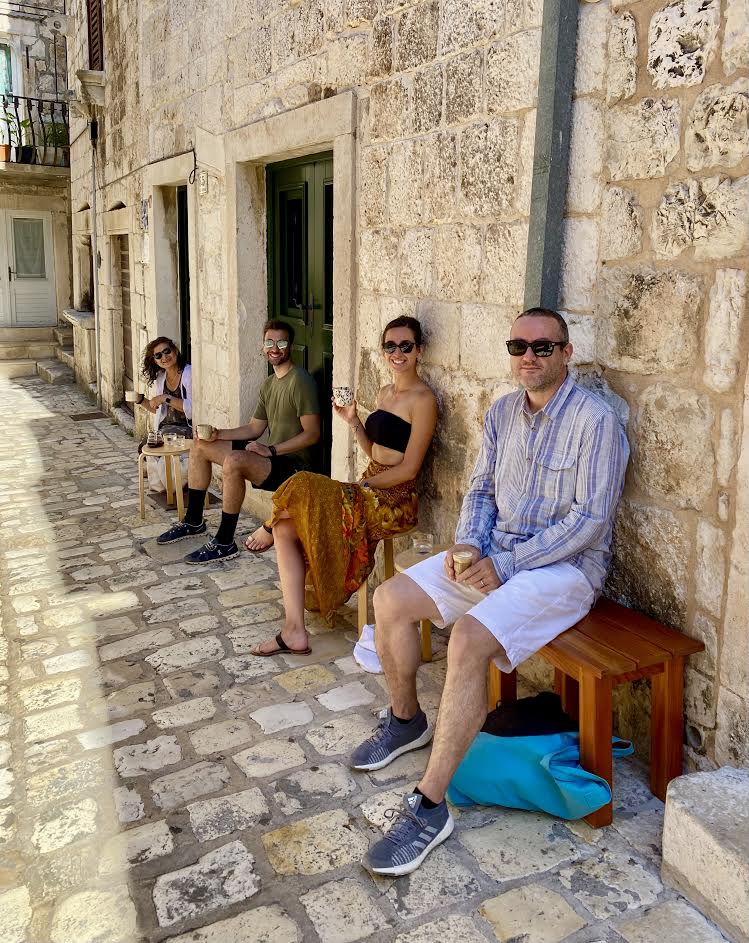
How did you choose Croatia and specifically Jelsa?
It was a major decision to travel, let alone temporarily relocate, during Covid-`19. After weighing the risks, we decided to take advantage of our new ability to work remotely. Prior to the pandemic, we had been able to work from home occasionally but not consistently. Many technology companies started to enable employees to work from home full-time in March and we knew that we would not need to return to our offices for several months. We fully embraced the uncertainty of 2020 - we closed our San Francisco lease in June, took a month-long road trip around the western United States, and then took a one-way ticket to Split.
We wanted to spend our time remotely working in Europe and Croatia was one of the few countries open to Americans in August. I had visited Dubrovnik, Hvar and Split a few years ago, so I had some familiarity with Croatia. We chose to avoid big cities, and decided that a smaller town on an island would be a good choice. We searched Hvar and Brač for accommodations and I was excited about this Airbnb in Jelsa, primarily because of the terrace and view. Jelsa turned out to be just the kind of destination we were looking for - quaint, walkable, and charming.
Our original plan was to stay about a month in Croatia and then travel to another European country. But within a few days of arriving, we extended our booking to two months. In October, we considered traveling elsewhere, but decided against it given the rising Covid-19 risk and changing border restrictions. Plus, we were happy in Jelsa and felt settled despite having been there for a short time. We’ve made some incredible friends here and feel a sense of community - for that, we are very grateful!
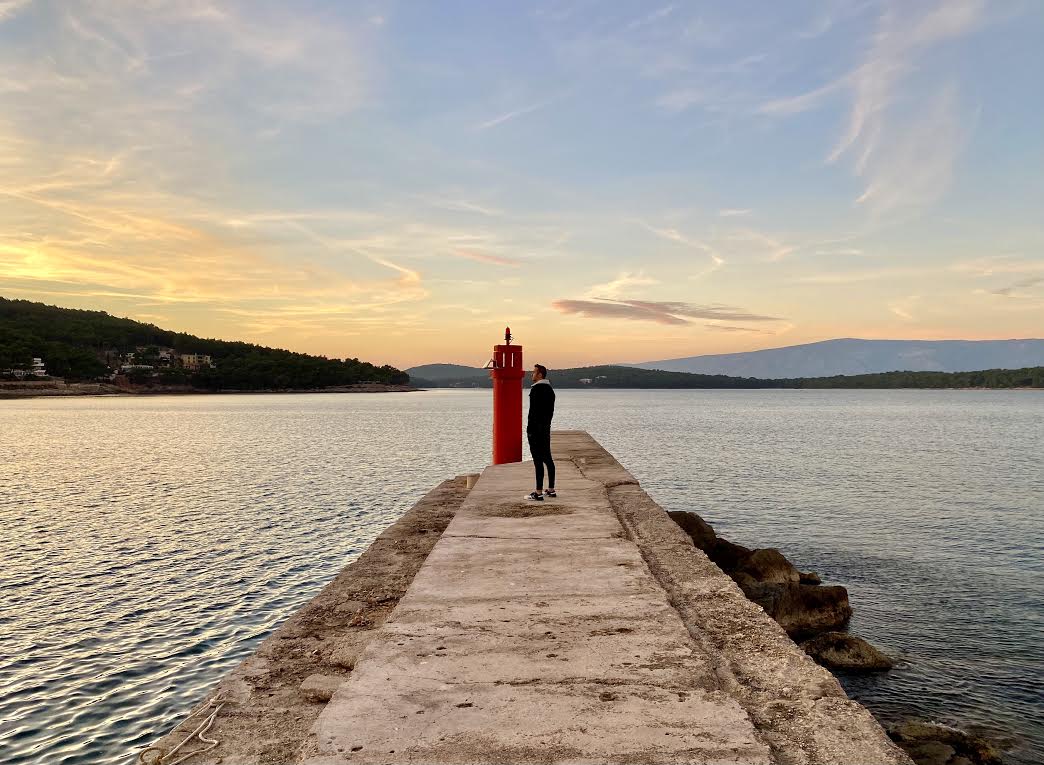
What’s important for a destination to offer to be compatible with a digital nomad lifestyle, apart from good WiFi?
This varies from person to person. We consider things that enable a good quality of life based on our priorities. Comfortable and affordable housing, ideally with a full kitchen and adequate desk space, is important. The beauty of the surroundings and access to nature is also a priority, at least for us. We’ve lived in busy cities, so one advantage of being a digital nomad is being able to live in serene and quieter places.
Being able to get around is important, so walkability is a plus. It’s also important to be able to find high quality food and have grocery stores nearby. Access to basic healthcare is also a consideration. Athletic facilities, such as a gym or soccer fields, are also pluses.
It’s easier to meet people and go about everyday life in places where English is spoken widely. Being able to connect with people is really important, so the presence of expat communities can be helpful, as well as the openness of the culture. We’ve had an extremely positive experience with Croatians in general - our friends and acquaintances have been so welcoming, friendly and willing to help us out with just about anything.
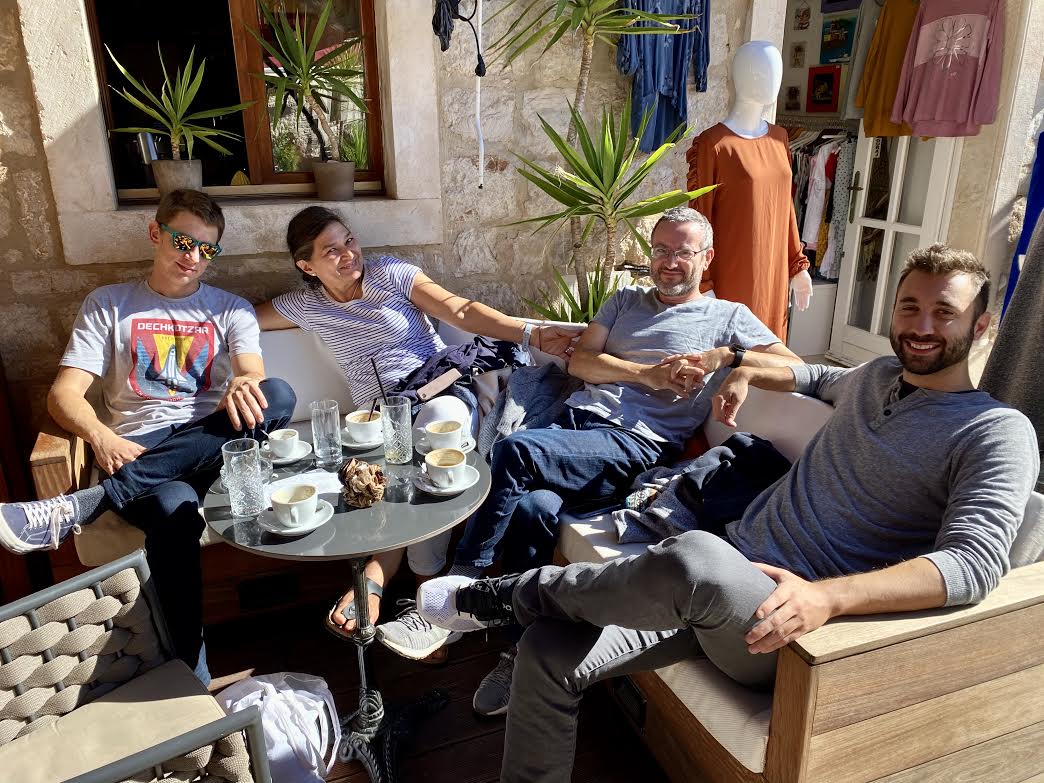
What’s your view on the future of remote work?
Remote and flexible work arrangements have been trending for the past decade or so, and Covid-19 has certainly expedited that trend. Many people have been encouraged to stay at home and non-remote companies have had to adapt quickly. As a result, I think it’s been eye-opening for workers and companies to see that, in fact, remote work can be productive and even beneficial for morale and results. Covid-19 is likely a forcing function for companies, as well as for individuals, to re-evaluate their work arrangements. Fully remote models may not work for everyone or every company, but I do think that flexible work arrangements will become the norm in some industries.
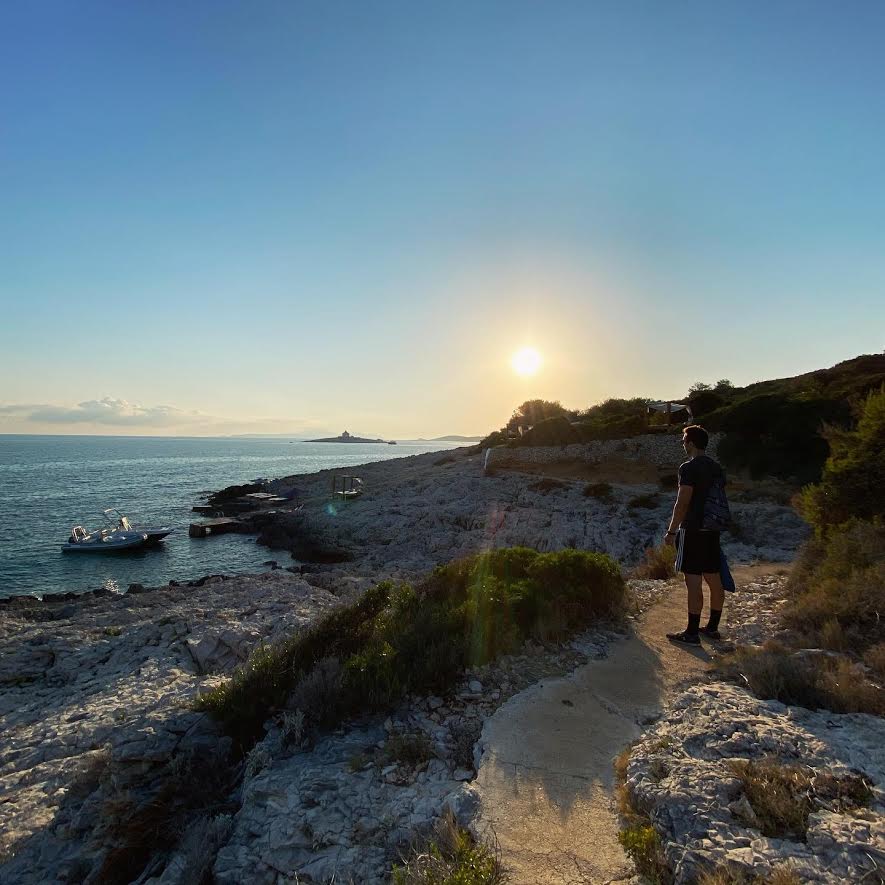
Do you have any advice for people looking to make the transition to digital nomad life?
Think about what you’re trying to optimize for and how different aspects of remote work do or don’t suit your lifestyle. If you’re relocating, research potential destinations before making the move. In order to be effective at your job and maintain good work/life balance, it’s important to be disciplined with your time and to set boundaries.
Most importantly - if remote work is something you want to do - just go for it! Companies are embracing remote work more now than ever. It may take some persistence to find a new role or company, or to negotiate with your current employer (which might be you!). Most decisions aren’t permanent - if it doesn’t work out, you can always go back to what you’re doing now. The grass isn’t always greener on the other side, but you won’t know until you take that leap.
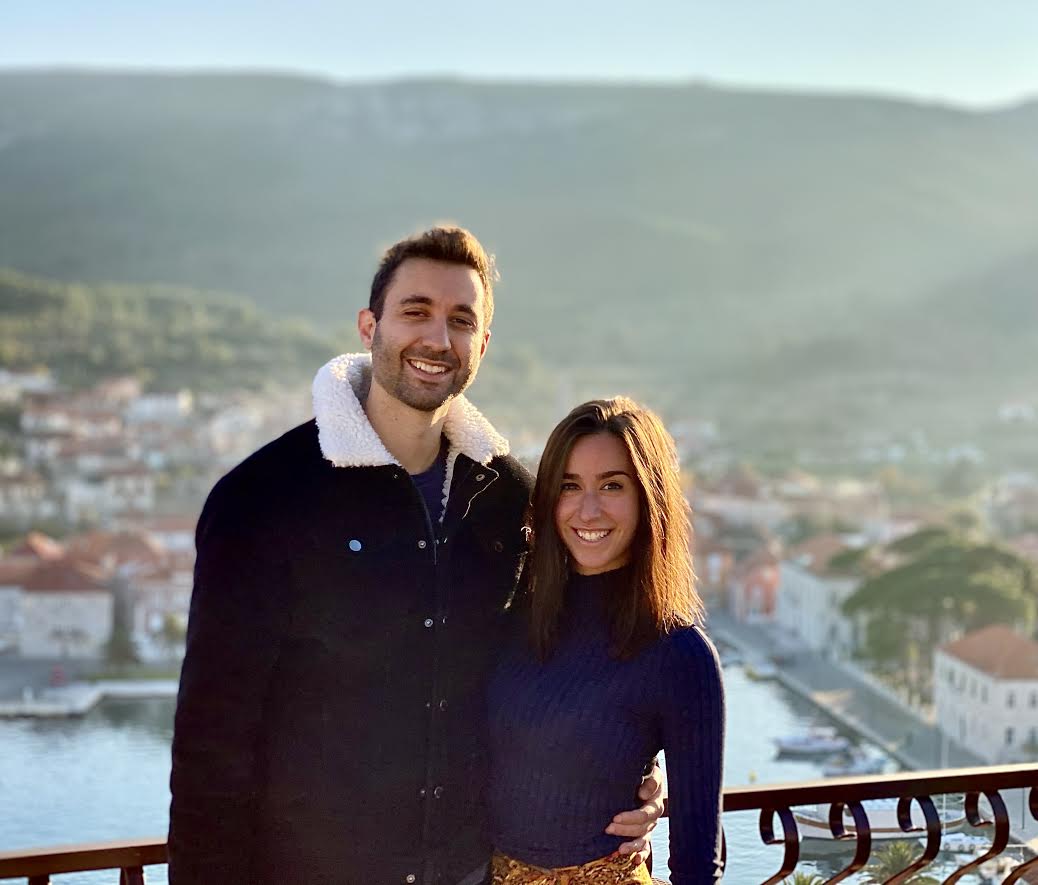
To learn more about Croatia for the digital nomad, check out the Total Croatia Digital Nomad guide.
To follow the latest news about digital nomads in Croatia, follow the dedicated TCN section.
Are you a digital nomad in Croatia who would like to be featured in this series? Please contact us on This email address is being protected from spambots. You need JavaScript enabled to view it. Subject Nomad
Digital Nomads Helping Split Winter Tourism this Year
December 19, 2020 - The numbers are in for November - and they aren't totally grim when considering Split winter tourism.
Believe it or not, there is some turnover in tourism this year, reports Slobodna Dalmacija.
According to the eVisitor system, there were 4,323 arrivals, and 21,671 overnight stays in the Split area in November, which is about 23 percent of arrivals and 53 percent of overnight stays realized compared to November last year, says the Split Tourist Board.
However, there are no noticeable changes. Moreover, according to Martina Nimac Kalcina, president of the Family Tourism Association of the Croatian Chamber of Commerce, this crisis has taken us back ten to twenty years.
"Regardless of the COVID crisis, the occupancy of private accommodation has always been very low from November 1 to April 1, which is understandable given that seasonality is generally pronounced in the Republic of Croatia, and it is an accommodation that is exclusively reserved for families and small groups, who mostly base their summer trips during the school holidays.
However, in the last few years, this seasonality has extended, especially in cities and luxury facilities, and we have been on the best path to making some destinations year-round.
Nowhere is the situation good. In situations when we lack guests from air destinations, the northern Adriatic always passes better, because it is more accessible by car to neighboring countries. Some brave guests go on vacation to a destination from which they can easily and quickly return home," says Nimac Kalcina.
The low occupancy that we currently have in private accommodation is mostly made up of foreigners who are on a longer stay in the Republic of Croatia, mostly digital nomads and people transferred to working online due to COVID.
"Such guests feel safer and more comfortable staying with us in private accommodation by the sea than in the cities where they normally live. Given this, we welcome the amendments to the Aliens Act, which enter into force on January 1, 2021. The category of digital nomads is extremely facilitated for obtaining visas for up to a year.
Some renters have already informed me that their guests have encountered the problem of needing to extend their stay because their tourist visa, which is valid for 3 months, is expiring. They would like to extend their stay precisely because of COVID. From January next year, this will be possible by a much easier procedure," she announces.
Due to the epidemiological situation and the recommended measures, there isn't much reason to celebrate this year.
"Given that, I believe no one expects reservations. On the other hand, we have been leading socially isolated lives all this year and will be doing so for some time to come. I believe that all those who can afford to should organize a short trip for themselves and their children.
Private accommodation is ideal for these trips because they have no contact with other people, and they do not need to meet the host if they do not want to. A large number of owners have already organized the possibility of "self-check-in." Unfortunately, this is a small number of potential guests because the spending power has dropped," says Nimac Kalcina.
Prices of accommodation this season are lower. Luxury facilities mostly did not lower prices (emphasizing holiday homes), while smaller units, by city, had significantly lower prices, averaging about 25 percent. For next season, she predicts prices similar to 2020 with better occupancy.
Still, it looks like hotels will recover more slowly because there will still be fewer group trips and fewer business events, regardless of their prices.
There will also be a smaller number of guests from third countries who were hotel guests in large numbers, due to the reduced number of airlines. Camps, on the other hand, could have a good occupancy rate.
"This difficult situation will not lead to a significant reduction in private accommodation. So far, to my knowledge, there has been a reduction of some 6 to 15 percent, depending on the region.
I expect that another percentage of renters will decide to deregister their accommodation units, but I also expect a part of the new facilities to be categorized.
First of all, I am thinking of the many hosts who have invested in their facilities and planned to categorize them in the spring of 2020. However, because of the pandemic, they decided to postpone the categorization for next year. The profitability of apartments with a large number of beds, rooms, in cities ... is questionable," says Martina Nimac Kalcina.
For the latest travel info, bookmark our main travel info article, which is updated daily.
Read the Croatian Travel Update in your language - now available in 24 languages.
Join the Total Croatia Travel INFO Viber community.
Croatian Digital Nomad Visa Update: KPMG Zagreb Explains Tax Law Change
December 15, 2020 - The Croatian digital nomad visa is getting closer, and the news is getting better. Especially regarding taxation, as KPMG Zagreb explains.
Four months to the day after Dutch entrepreneur Jan de Jong sent an open letter to Croatian Prime Minister Andrej Plenkovic asking him to introduce a digital nomad visa, Narodne Novine (National Gazette) published confirmation of the latest concrete step towards the realisation of that visa on December 11 - a change in the Croatian tax code to include the tax obligations of digital nomads.
Recall that 44 days after that LinkedIn post, Plenkovic met with de Jong and then tweeted his intention to introduce the digital nomad visa for Croatia. A proposed amendment to the Aliens Act was introduced to Parliament the following day, which soon resulted in a change in the law, effective January 1, 2021. The framework for the visa was in place in terms of legislation.
But we were (still are) not there yet. There were plenty of details to be ironed out. What would be the conditions of the visa, how to apply, what about tax obligations etc? As all these things had not been ironed out, it is understandable that further official announcements are pending all the final details being worked out. The most important of these I would summarise as:
Will the visa be physically available on January 1, 2020, or just in terms of legislation framework?
What are the conditions of the visa, for example minimum income requirement?
How much will the visa cost?
How to apply for the visa?
What about tax obligations in Croatia for digital nomads living there?
Big questions, and until we have the answers to them all, we will not have a full picture. But details are emerging, as the various ministries put into place the legal framework. And here is a big one to announce - a law change to reflect the tax obligations to Croatia for digital nomads. Rather than me trying to explain it, the news and explanation would carry a little more weight and authority if it came from a tax authority. Kristina Grbavac, Director of Taxation Services at KPMG Croatia kindly agreed to speak at our recent Digital Nomads for Dubrovnik conference, and I asked her to keep me updated on any update in the tax law for digital nomads. Here is what she sent me:
From 1 January 2021, anyone who is not a citizen of the EU, Iceland, Lichtenstein, Norway or Switzerland could be eligible for a Croatian digital nomad visa of up to one year, as long as the person does not work for or provide services to a Croatian company. The digital nomad could extend this visa for another one year after a six-month physical hiatus out of Croatia.
Coupled with the change in the immigration legislation there has also been a change in the tax legislation: from 1 January 2021 anyone working in Croatia under a digital nomad visa will be exempt from paying Croatian tax on income earned from activities directly related to the status of being a digital nomad.
The legislation passed voting in the Parliament on 4 December 2020, it was approved by the President of Croatia and published in the National Gazette (138/2020) on Friday, 11 December 2020.
Here are the links to:
Relevant is Article 2:
- primitke fizičkih osoba ostvarene po osnovi obavljanja nesamostalnog rada ili djelatnosti za poslodavca koji nije registriran u Republici Hrvatskoj temeljem stečenog statusa digitalnog nomada sukladno posebnom propisu.".
Translation - The income earned by natural persons realised on the basis of performing non-independent work or activities for an employer who isn't registered in the Republic of Croatia on the basis of the acquired status of ''digital nomad'' in accordance with a/the special regulation.
Further changes in the tax legislation are expected which would relieve digital nomads from tax reporting obligations in Croatia. Given the tremendous changes in legislation made for digital nomads, it seems to us that it is only a matter of time until this will be confirmed.
With all of this, Croatia is becoming one of the top countries of choice for digital nomads
For those of you with any questions about tax and digital nomads, I recommend you ask Kristina, rather than me. You can contact her on This email address is being protected from spambots. You need JavaScript enabled to view it.
So what do we know about the visa for sure, what about unofficially, and what do I expect the answers to those remaining unanswered questions to be?
What we know for sure.
The legislation has been passed to allow for the digital nomad visa from January 1, 2021. This is NOT the same thing s saying the visa WILL be available - more on that below.
The Croatian tax code has now been legally amended to reflect digital nomad tax status - see above.
What we know unofficially from Jan de Jong's latest update on LinkedIn.
Having initiated the visa story with that LinkedIn post, de Jong has played an active role in pushing things forward, holding several meetings with ministries to sort out all the details. While not exactly the same as an official ministry announcement, his regular LinkedIn updates on the subject have come with the authority of someone at the heart of the discussions. And yesterday's update gave some information on two of the key unknowns - when will the visa be available, and how to apply?
Currently the Ministry of Finance is working on making the changes to the tax laws - which shall be completed by the end of this year.
Ministarstvo turizma i sporta / Ministry of Tourism and Sport and the Ministry of Interior shall together make efforts to develop an official website where digital nomads can find all information about Croatia’s visa program. On this website it shall also be possible for digital nomads to apply for the visa.
The objective is to have this website live by March, 2021.
You can see the full post on Jan's LinkedIn.
What do I expect from the remaining key unanswered questions?
I refer you to an article I wrote last week regarding the foundation of the Croatian Digital Nomad Association and a visa update. For those without the time to read, my thoughts were that there would be no tax obligation in Croatia (see above), there would be an online application process (see above), and that while technically it could be available on January 1, sometime in the first quarter was more likely (see above). The other things I would expect - but yet to be announced - are:
Minimum income in the region of 1,500 to 2,500 euro a month.
I would expect the visa to cost a maximum of 100 euro.
Guidelines on what constitutes a digital nomad to quality for the visa will be published in due course.
Health insurance will be required.
No criminal record will be required.
No working with Croatian companies or inside Croatia under the terms of the visa.
Please note, these are my opinions, we are still waiting for the official announcements.
None of these things have been officially announced yet, but as the tax law change shows, things are moving forward. Perhaps not quick enough for digital nomads used to instant gratification, but in terms of changing Croatian law, this is cutting edge.
I am sure that when all the details are finalised, the full initial guidelines will be published. We will, of course, bring those to you as soon as we have them, and you can follow the latest on the dedicated TCN digital nomad section.
Washington Post: Croatia Attracting Digital Nomads During the Pandemic
December 9, 2020 – One of the leading American daily newspaper, the Washington Post, published an article about Croatia attracting digital nomads from the USA while the rest of Europe banned all travel.
The Washington Post wrote about digital nomads who spent several months in Croatia and Dubrovnik during the coronavirus pandemic, said Ina Rodin, the Croatian National Tourist Board director in the United States.
The article states that many Americans decided to travel thanks to the first direct airline between Croatia and the United States, namely between Dubrovnik and Philadelphia, introduced in June 2019. According to the Croatian National Tourist Board, Americans were the second most numerous guests in Dubrovnik last year, with almost 160,000 arrivals and more than 442,000 overnight stays, writes the Washington Post.
Sarah Morlock, a freelance writer and social media manager from Indiana, who worked remotely and spent October and November in Dubrovnik with her partner, shared her experience with readers. She pointed out that when choosing a place to stay, she is looking for historic cities with preserved nature and a good internet connection, and in that sense, Dubrovnik has fulfilled all her expectations.
Binational couples attracted too
Apart from digital nomads, Croatia is also attractive for binational couples who, due to the coronavirus pandemic and limited travel opportunities, organized their meeting in Croatia.
One of the couples who did so was Justin Leung from the USA and Katja Lau from Germany. They were supposed to meet in San Francisco, but the coronavirus pandemic and lockdown thwarted their plans. Therefore, they decided to find a place that welcomed both Americans and Germans and thus chose to meet in Croatia, where they spent one month.
The Washington Post points out that Dubrovnik is trying to attract digital nomads, so a project to introduce ultra-fast broadband Internet was presented in February. Also, a virtual conference "Dubrovnik for digital nomads" was held in October to encourage them to choose Dubrovnik for their remote office.
Washington Post covers this topic right when the introduction of the digital nomad visa in Croatia is increasingly likely. Namely, TCN reported a new update about digital nomad visas in Croatia today, as the Croatian Digital Nomad Association has officially been founded.
At the beginning of 2021, Croatia will introduce a digital nomad visa, which will make it the second country in Europe and the fifth in the world to welcome digital nomads from all over the world.
Croatia Through the Eyes of a Digital Nomad: Giving Back While Gaining New Friends
December 9, 2020 - Cyndie Burkhardt continues her nomad lifestyle with her experiences in Croatia - this week the digital nomad giving back through volunteering.
Digital nomads, travelers, and expats are often passionate volunteers in their host countries. On International Volunteer Day, a group of people from different backgrounds and cultures came together to show some love to the Split community.
Passionate travelers strive to be immersed in the countries they visit by living and working with local people. For many of us, participating in positive impact initiatives is a favorite way to become more involved and to support causes we care about. Volunteers contribute all over the world, often to projects that would not exist without them. The rewards are considerable—help improve a community and bond with some pretty cool people in the process.
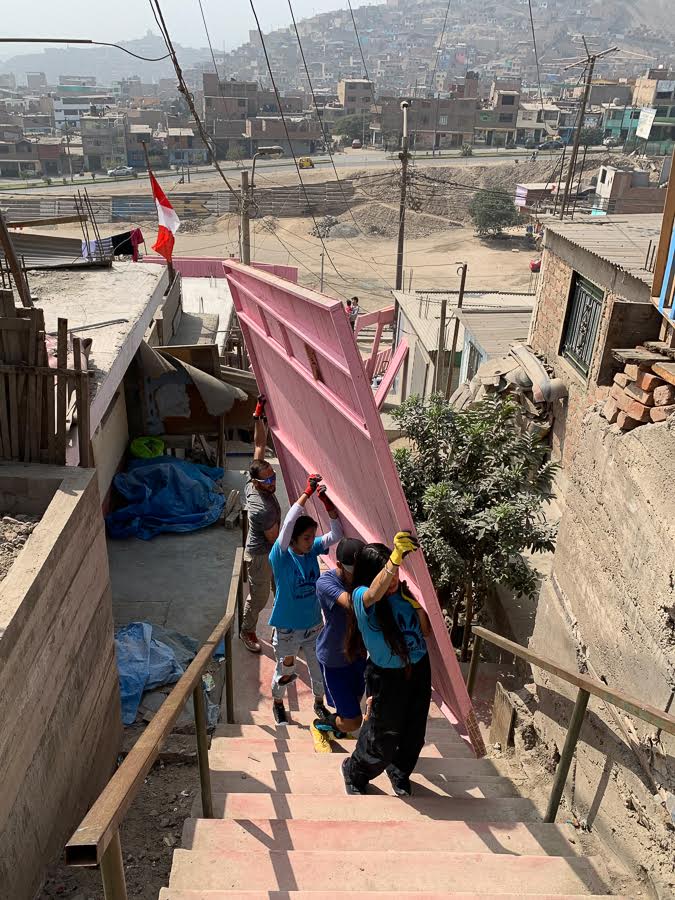
(Volunteers for Make a Miracle home building project near Lima, Peru carry all parts of a prefab house up multiple flights of steep steps to a site on the hillside where the house will be assembled. All hardware and tools follow the same pathway up. At the end of the day a family will have a safe place to live.)
Positive impact
People volunteer for a variety of reasons: to give back, help others, make a difference, feel involved, or use their skills in a productive way. For me, it’s each of these as much as being curious about culture and lifestyle. Volunteering gets you right in the middle of someone else’s reality. Some situations are feel-good and others are a dire wake-up call; all are opportunities to learn. Glimpsing a country through this sort of local experience is a chance to expand your perspective while becoming more conscious of your actions.
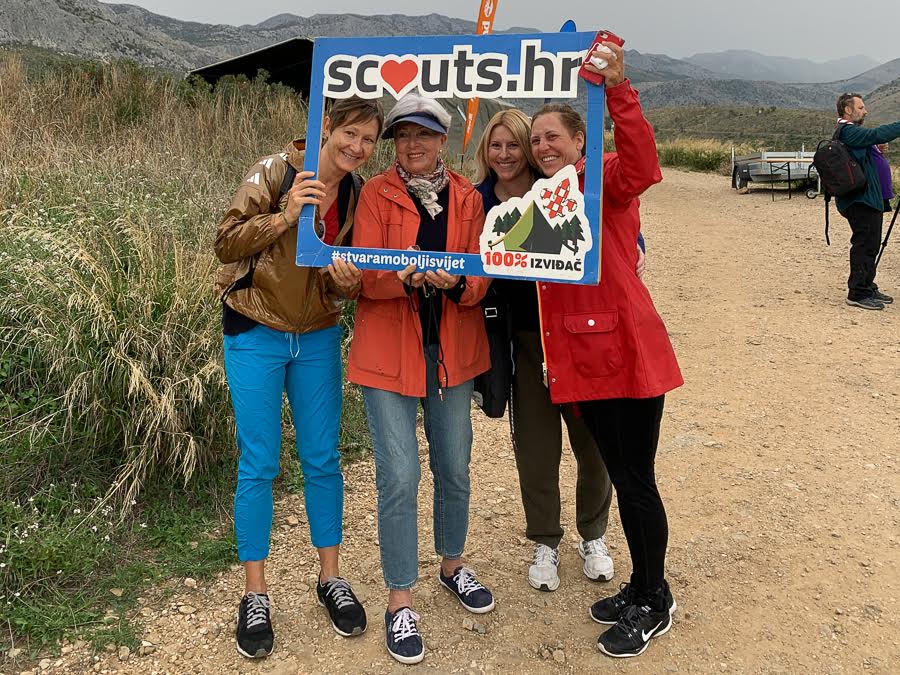
(Groups of friends, old and new, meet up to volunteer for the biggest reforestation project on Mosor Mountain, organized by The Scouts of Croatia Association.)
Safe housing
Last year I joined a home building project in Peru with a nonprofit whose mission is to “bring hope and lasting change” to poor neighborhoods, in part by ensuring that families with children live in safe homes. Scoping the dilapidated surroundings and the rundown shacks that people occupied, it looked like something out of a movie, for as far as my eyes could see. I tried to imagine living there, and worse, having no way out. My heart ached. Us volunteers worked side by side with the organizers, locals, and students. At the end of the day when the designated family was presented with its new home, there were tears, hugs, big smiles, and no better feeling than that of optimism. When you’re used to having a roof over your head you take it for granted. Being immersed in that environment and seeing the status quo of not having one really hit home for me.

(The Elephant Freedom Project is a camp in Thailand, near Chiang Mai, that rescues abused animals and allows visitors to learn about them and support their efforts. Baby elephants are there with their moms and they learn to interact with humans in a caring environment.)
Elephant freedom
Another time, in Thailand, I spent a day at an ethical elephant sanctuary—a camp that rescues and provides a better life for the animals—where I got to feed and bathe them in nature. Elephants are the beloved national animal and official symbol of Thailand and for that same reason they’re horribly abused in the name of profit. While feeding them, I watched the elephants inspect my hand and turn their trunks to just the right angle to grasp the food. It tickled when they took it. I swear there were moments when I looked in their eyes and I knew they were looking back at me. All day I witnessed, in awe, their sensitivity and intelligence. Of the many things I learned, nothing compared to my feeling of connection with these beings.
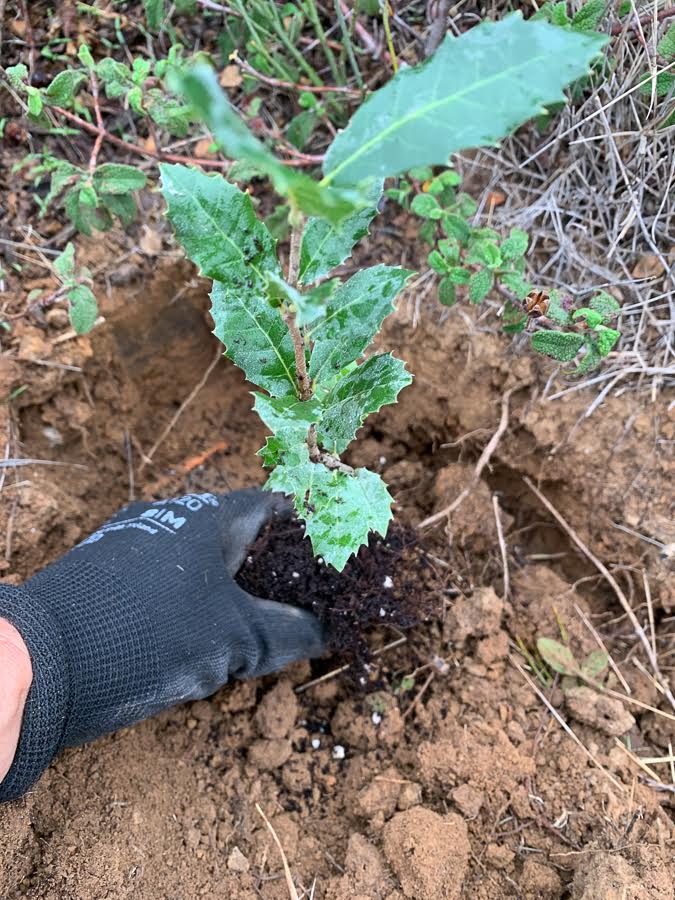
(Forestry rangers instruct volunteers on the proper way to plant new seedlings; the reforestation project goals are to plant over 30,000 new trees to replace those lost in the massive 2017 fire.)
Split causes
Here in Split, lots of organizations coax volunteers to support their cause. A recent meet-up was held to introduce a few of them, including animal rescue, a women's shelter, and environmental groups. Animal shelters are dangerous for me, I love dogs and I want to take them all home. But that didn’t stop me from spending time at NO KILL animal shelter Animalis Centrum. Hiking and being in the great outdoors are other passions of mine. I quickly said yes to volunteering for a reforestation project on Mosor Mountain organized by the Croatian Scouts Association. It feels good to circulate in the community and experience the camaraderie of real people doing real things. In other words—it’s time to get off the computer!
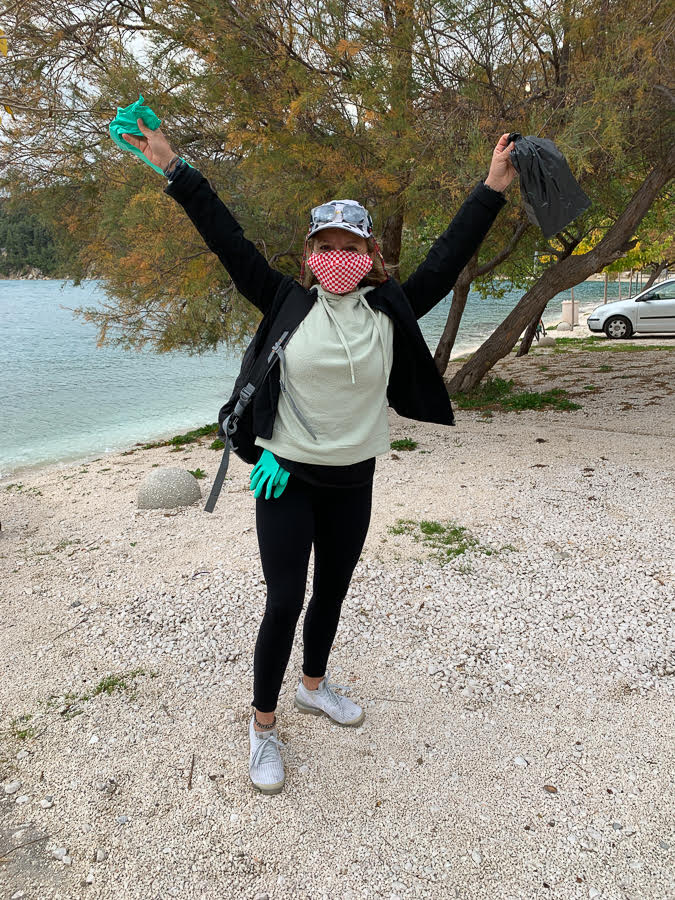
(Paola Palavecino is a spit ball of energy and she enthusiastically inspires her team to give their best effort and have fun.)
Beach cleaners
On International Volunteer Day, December 5, an independent crew led by Paola Palavecino descended on Kašjuni beach with trash bags, gloves, face masks, and determination to clean up the litter. For this lifelong beach kid, the assignment was a no-brainer. The seashore is my special place and it drives me mad to see trash discarded on the beach and washed up at the water’s edge. Who wants to lay their body down with that crap or swim through it? Given Croatia’s hunger for tourism, its heavy promotion of seaside/island pleasure, and its pride in the stunning natural landscape, immaculate beaches would be expected.
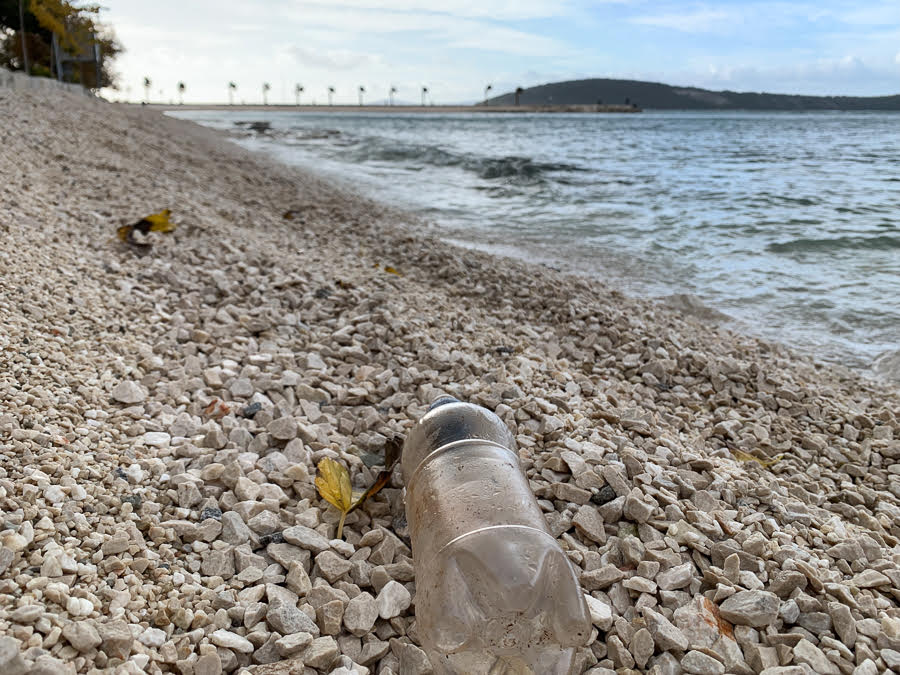
(Discarded plastics are a common sight on Split’s beaches and even isolated spots like Kašjuni beach can’t avoid them.)
It was the first dry day after a week of slamming rain and thankfully the storm clouds held off. In a matter of hours, we hauled construction waste, filled large garbage bags, and stuffed smaller bags with cigarette butts.

(Cigarette butts cause insidious harm through the release of heavy metals and other toxic chemicals. Statistics show that trillions of them are recklessly discarded, making them the world's most littered plastic pollution.)
Public Service Announcement
Pardon this interruption for a brief PSA: That last item may seem inconsequential because cancer sticks are so widespread here, but the facts are disturbing. Littered cigarette butts leach toxic chemicals—arsenic, lead, nicotine—into the environment and they can contaminate water. The toxic exposure can poison fish as well as animals that eat them. What remains is literally the world's most littered plastic pollution—trillions of those filtered tips are carelessly dumped into the environment annually. Whoa.

(A new garbage product is popping up everywhere, the protective face mask.)
People’s consciousness
While I was cleaning one particularly trash-ridden part of the beach, a local was watching me go back and forth. Eventually he asked what was happening and I explained our effort and who we were. He didn’t understand why foreigners cared about cleaning the beach but he was impressed nonetheless. Contemplating this and looking at my trash bags filling up he said, “I think this says something about the consciousness of the people.” I said I agreed and then he walked away before a conversation could ensue. Boy did I want to talk with him and ask some questions. Perhaps he felt embarrassed, or maybe guilty, about what that consciousness actually says.
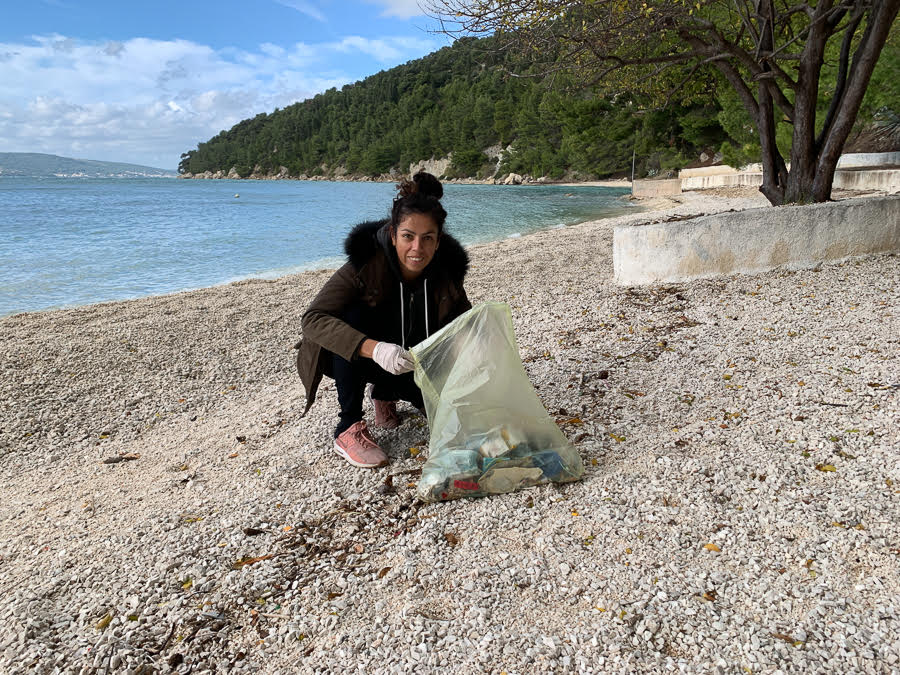
(Volunteer Roxana Jamett is no stranger to environmental projects and sustainability. With her blog Eco-Croatia.net she shows people what’s possible to reduce plastics and live in healthier, cleaner world).
Travelers’ mistress
Travelers do care, deeply. The world is our mistress and we gush with enthusiasm at every opportunity to engage with her. The benefits we reap through exposure to people and places and new possibilities are priceless.
In fact, the beach cleaning group was born from this mindset. An American traveler inquired on Facebook about cleaning Split’s beaches. Paola, a Chilean expat, read the post and recognized the need. Seeing that nothing was organized, she said “why not” and confidently rose up to lead it. The group that convened represented the additional countries of Australia, Croatia, Italy, and the UK.
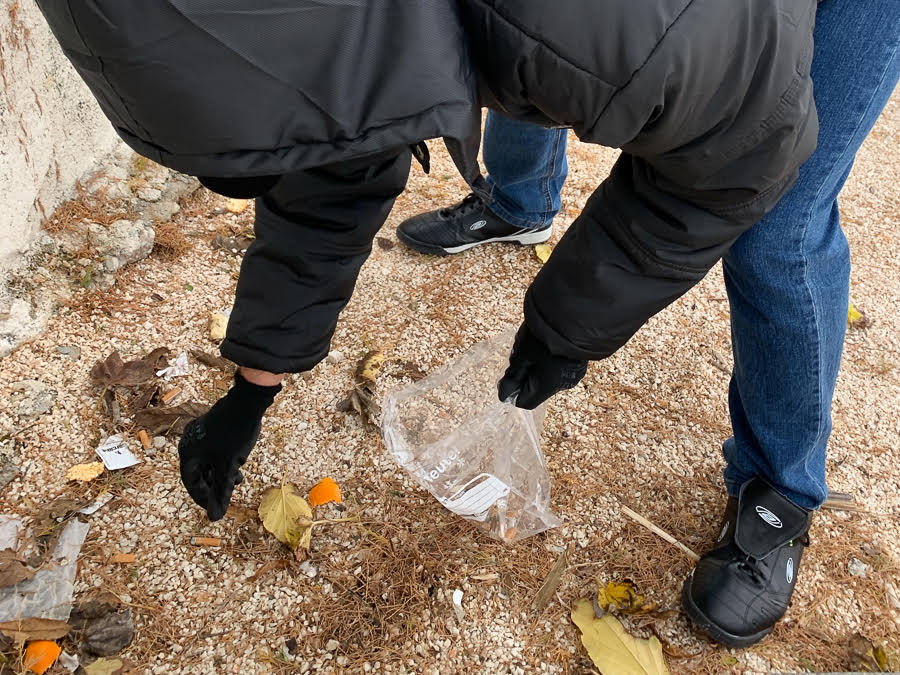
(Picking up refuse is tedious and backbreaking, but the toxicity from cigarette butts and their damage to people and the environment is worse.)
International Volunteer Day
International Volunteer Day is a mandate of the United Nations General Assembly since 1985. It promotes volunteerism; recognizes volunteer contributions to local, national, and global communities; and celebrates all facets of volunteer impact. It was an honor and a source of pride to be with such a proactive group on a day that stands for caring and giving.
Top 5 Reasons
For anyone who’s curious about the joy of volunteering and hasn’t yet raised their hand, here are some things to consider.
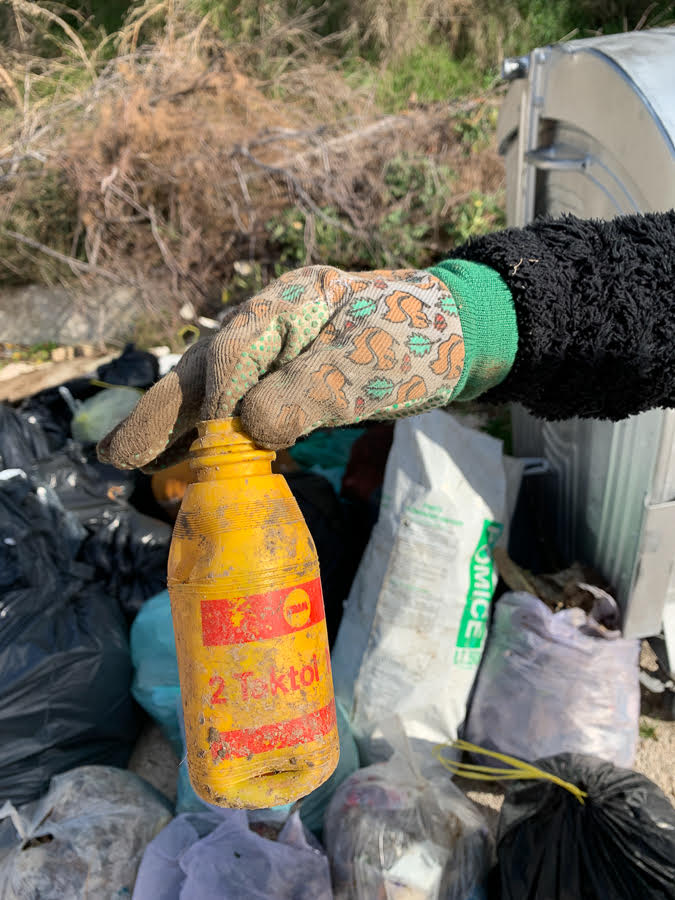
(The product 2 Taktol is motor oil and this particular plastic bottle, found on Kašjuni, is a design from last century, it’s over 20-years old.)
1. Volunteering abroad is an opportunity of a lifetime to make a difference in a particular region; experiences and memories will stay with you for the rest of your life. You will truly become a traveler and not just a tourist.
2. Volunteers gain new perspectives and often return home with a better understanding and appreciation for different cultures and people.
3. Meet new people and make friends for life with like-minded folks who face problems head-on and in doing so become part of the solution.
4. Contribute to something bigger than yourself and boost your career. People who volunteer abroad demonstrate innovation, creativity, selflessness, and willingness to “get their hands dirty.” Wouldn’t you want to hire or work with someone like that?
5. Give back by helping communities, environments, people, and animals who are endangered or unable to take care of themselves. It’s about realizing that we are all connected through a greater humanity.
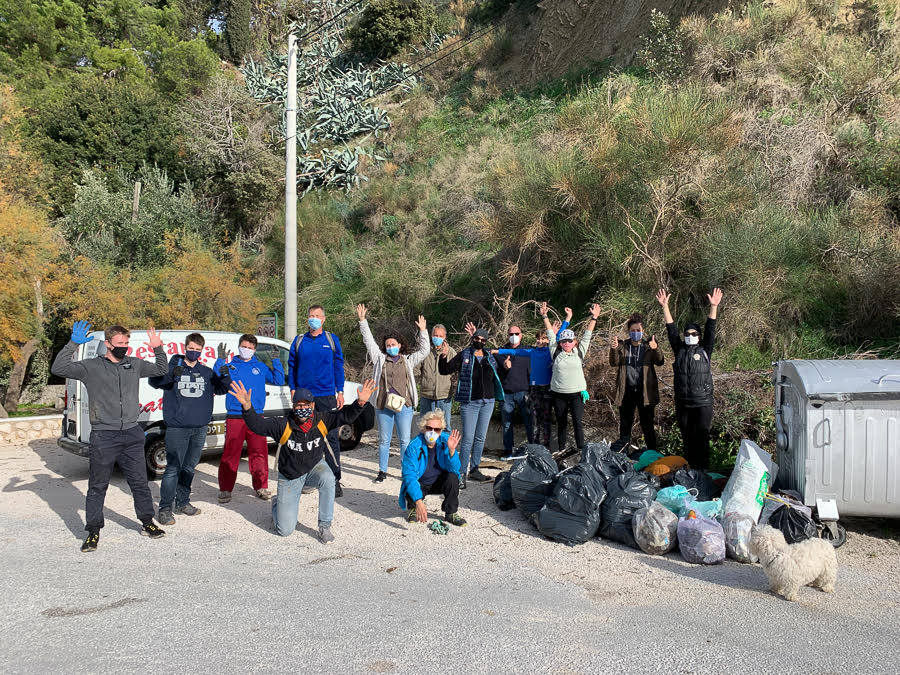
(The Kašjuni beach cleaning volunteers are proud of a strong effort to give back and help make a difference.)
Learn more at TCN’s Digital Nomads channel.
Story and photographs ©2020, Cyndie Burkhardt. https://photo-diaries.com
For more of Cyndie's experiences, check out her Croatia Through the Eyes of a Digital Nomad column.
Croatian Digital Nomad Association Officially Founded (& Visa Update)
December 9, 2020 - As the digital nomad visa inches closer to reality, the Croatian Digital Nomad Association is founded. More on that, and a visa update.
It all started with an open letter on LinkedIn to the Prime Minister last than four months ago. 44 days later, PM Plenkovic tweeted his assent - his government would push for the introduction of a digital nomad visa for Croatia, which would make it only the fifth place in the world and the second in Europe after Estonia (Dubai and Iceland have since also announced nomad visas). And the word is getting out, with the Washington Post the latest global media to feature digital nomads in Croatia, including the Dubrovnik for Digital Nomads conference, which was recently co-organised by TCN, Saltwater, the City and Tourist Board of Dubrovnik.
Jan de Jong, the Split-based Dutch entrepreneur whose LinkedIn post in July started the whole process rolling, announced plans at the Dubrovnik conference to found a Croatian digital nomad association in order to help make Croatia a more attractive destination for nomads, by offering a range of services to help build and serve the nomad community.
The new Croatian Digital Nomad Association will have five key areas of focus, as explained in the infographic below.
De Jong took to LinkedIn once again this morning to announce that the Croatian Digital Nomad Association has been officially founded:
YES!! We have officially founded the Digital Nomad Association Croatia ??. Together we shall unite & serve digital nomads in Croatia.
It looks like Croatia will not only be among the first countries in the world to welcome digital nomads - but we shall also have among the most attractive visa programs currently out there.
Changing the laws in Croatia in order to welcome digital nomads was just the start of a great and exciting journey.
Croatia has a chance to position itself among top destinations globally. There is a lot of work ahead of us - both in the private & public sector. That is the reason why we wanted to organize ourselves in an association.
If you want to:
✅ Join the association
✅ Support the association
✅ Volunteer at the association
Then please, follow Digital Nomad Association Croatia on #LinkedIn as more updates will follow soon - stay tuned.
I would like to thank my co-founders Tanja Polegubic & Karmela Tancabel for their efforts and insight. Thank you Younited Agency for our visual identity.
Last but not least, thank you all for your support. We would not have come here without your comments and shares
Give this post a ❤ as your first action to support the Association!
Pozdrav,
Jan de Jong
#Croatia
#DigitalNomads
#Remotework
What is the latest with the Croatian digital nomad visa?
Apart from the many questions I get about the new rules for entering Croatia at the moment, the most common request for information I am getting these days is a progress report on the availability of the digital nomad visa. There has been a LOT of interest in the visa, with Croatia perfectly positioned to offer a great nomad lifestyle experience to visiting remote workers. There is also understandable frustration from the initial tweet from the Prime Minister back in late August, and the still-undefined terms of the visa or the timing of its availability.
Here's my take on the current situation and what and when I think might happen (PLEASE NOTE that this is just my personal observations only, and you should wait for official confirmation before making any firm decisions).
What we know for sure is that the legal framework is now in place for the digital nomad visa to be available from January 1, 2021, as a result of a change in the Aliens Act a couple of weeks ago, as previously reported on TCN.
What is still to be finalised (and various ministries are working on the final details, to be completed by the end of the month) are the exact conditions of the visa, details of which are yet to be announced. Here are some of the main
Who can apply for the digital nomad visa?
I would expect that anyone who has a bone fide remote business will be able to apply for the visa. Key restrictions on the visa would be that no business can be done in Croatia or with Croatian companies. This visa is for remote workers earning their money abroad and spending locally.
How much will it cost?
I have not yet heard a figure for the visa fee, but I would be very surprised if it was anything more than a nominal fee, or even free of charge. Barbados is charging US$2,000 for an individual, US$3,000, which defeats the point of what Croatia is trying to achieve. There is little point creating a product and then making it prohibitively expensive.
Will proof of a minimum income be necessary? If yes, how much?
As more and more countries are introducing digital nomad visas, it would be understandable to assume that the products are basically the same. They are not. Just as Barbados is charging US$2,000 for the visa, so too others have prohibitive minimum income requirements. Dubai requires a minimum of US$5,000 a month, Iceland more than US$7,000 a month. I have not heard a figure mentioned for Croatia yet, but I would expect it to be considerably lower, but high enough to ensure that those who do come have the spending power to help the Croatian economy. A figure of 1,500 - 2,500 euro a month minimum would make Croatia much more accessible, as well as providing a new generation of word of mouth promoters for the country's tourism.
What about tax payable in Croatia?
This is one of the big unknowns, and one which will be 100% certain next week. Will digital nomads have to pay tax in Croatia? My feeling is that the Croatian visa will come without a tax requirement to Croatia. These may seem strange to some people until you take a closer look at the realities of who might be using the visa. Perhaps the best example I can give to illustrate the point is the Russian/Ukrainian couple from Munich who I came across last year in Jelsa who truly opened my eyes to the possibilities.
They both worked in IT, and their Munich boss told them that he was happy for them to remote work 10 months of the year, as long as they were available online during Munich working hours. They could have stayed at home and enjoyed remote work in Munich, but they decided instead to rent out their apartment and spend the time travelling - 3 months in Jelsa, then to Sicily, Spain and Portugal. They came to Jelsa from April 1 - June 30, renting an apartment for three months out of the main season. So happy were they that they planned to return for the same dates this year. They ate in the restaurants, drank in the cafes, bought local in the markets, took Croatian classes. Income coming into local businesses in Croatia which would otherwise have been spent in Munich.
Multiply these remote workers and there is a slow effect not only on the Croatian economy but also on local businesses and communities. By making Croatia an attractive destination in terms of tax liabilities, visa cost, and minimum income, this is a real opportunity. The market will only get more competitive, as more visas are offered. It should be noted that my example above does not require a visa, as they are EU residents, but I wanted to give a concrete example based on the economic benefits, even with no tax liability.
KPMG Croatia has kindly agreed to provide a tax guide article for digital nomads in Croatia, which we will be publishing later in the month.
What about health insurance?
I would expect health insurance to be a prerequisite.
Criminal record?
I would expect proof of no criminal record to be a prerequisite.
How to apply for a Croatian digital nomad visa?
We are also still waiting for details of this. I would expect this to be an online process, devoid of the usual bureaucratic obstacles. The Ministry of the Interior did an outstanding job this year with its border control, and its Enter Croatia form was an unqualified hit. This is the ministry which is driving the introduction of the visa, and this is the ministry which really performed this year in dealing with border and tourist movement. It was impressive to watch.
How long will the application take to be approved? That I have no answer to.
Will the visa be available on January 1? While technically, it could be, whether or not the final pieces of the jigsaw are in place is not certain. But I think it is fairly certain that it will be available in the first quarter of next year.
We will post any updates on our dedicated digital nomad section, which you can follow here.


